bob and diane fund
2020 MENTORSHIP GRANT
Editor’s Note from Bob and Diane Fund Director Gina Martin:
I first became aware of Paul John Bayfield’s moving work, Keeping Mum, in 2019 and was moved to support his documentation of his mother’s decline while caring for her at home, through various periods in the hospital, and residential care in Great Britain before and during the COVID pandemic.
With the Bob and Diane Fund support, Keeping Mum has been published in print and digital forms with various international publications including National Geographic. Keeping Mum has also appeared on television and radio and in 2021 will be featured in ‘RANKIN’s 2020’, a book showcasing the most compelling photographs from around the world in 2020. The project is mentored and edited by Sarah Leen, former Director of Photography of National Geographic and founder of Visual Thinking Collective. We are proud to support this work that will continue to bring visual awareness to Alzheimer's and dementia.
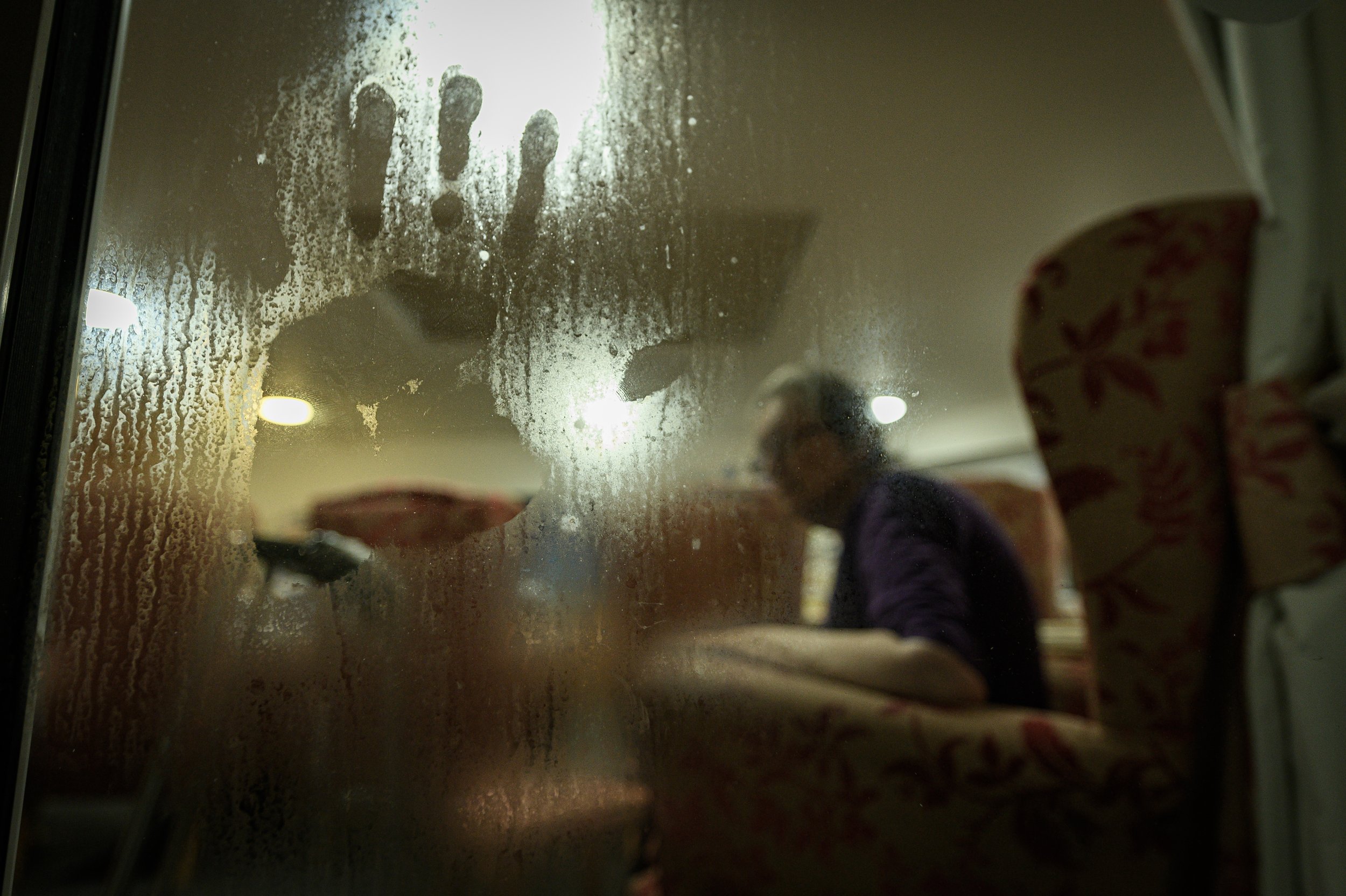
Keeping Mum
By Paul John Bayfield
Dementia is a thief. Janice Elizabeth Middleton was diagnosed with Frontotemporal Dementia, one of the rarest forms of dementia, robbing her of speech, movement and control of her body. For three years while caring for her, photographer Paul John Bayfield documented his mother’s journey from diagnosis to her death.
Photographer Bayfield hopes that ‘Keeping Mum’ will contribute to a wider understanding of the complex nuances and challenges of dementia and the links it has to other diseases. The methods of care and data he and his mother compiled are already being implemented by palliative care personnel both in Britain and the United States. New methods of physical care give insight into the effects of neurological decline and aid communication, morale and mental wellbeing.
Keeping Mum will help answer some questions for those who have recently been diagnosed with the disease and what they can expect on their own journeys.
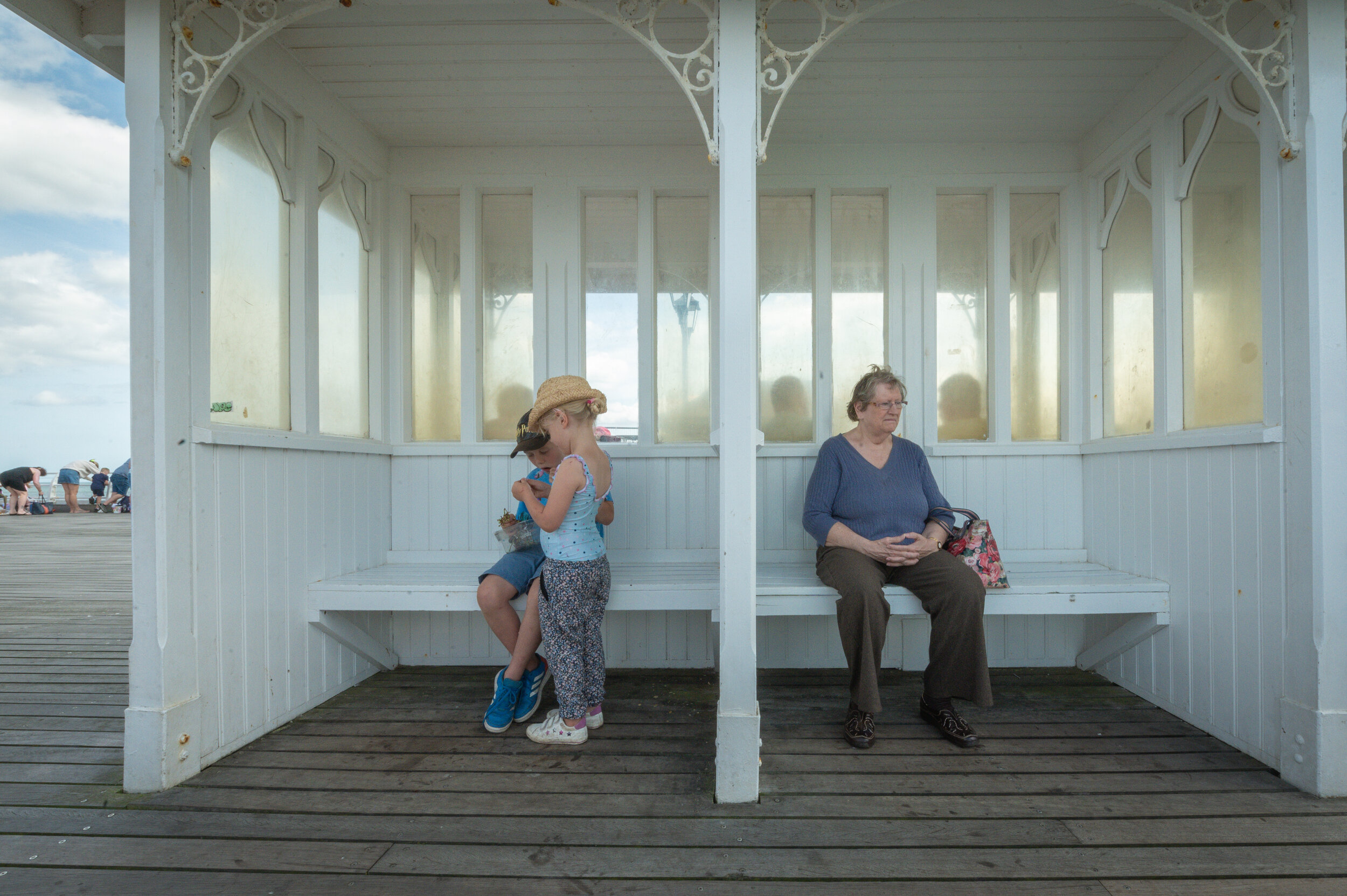
Trips to childhood locations she shared with her brother seem to spark a little joy. It's hard to find a bridge between her world and mine. I try my best to distract her from her worries but the illness has quickly taken hold and she has already started to lose the ability to communicate as she once did. Two children play as her and her brother wouldve done decades ago as mum sits.
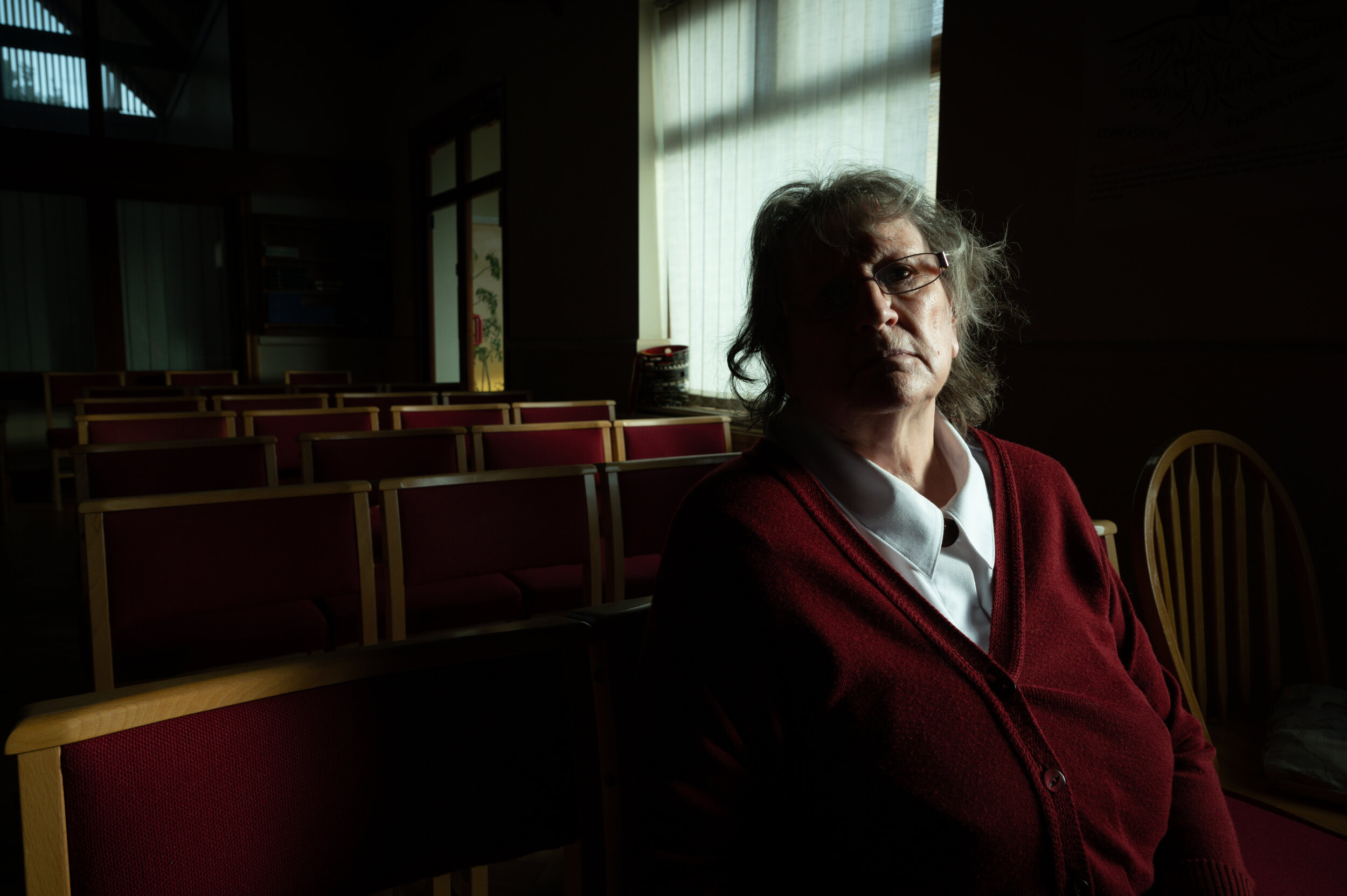
As her brain shrinks her personality changes. She now insists on being early for everything. We often sit for over an hour on our own. This can often be easier than allowing her anxiety to take hold.
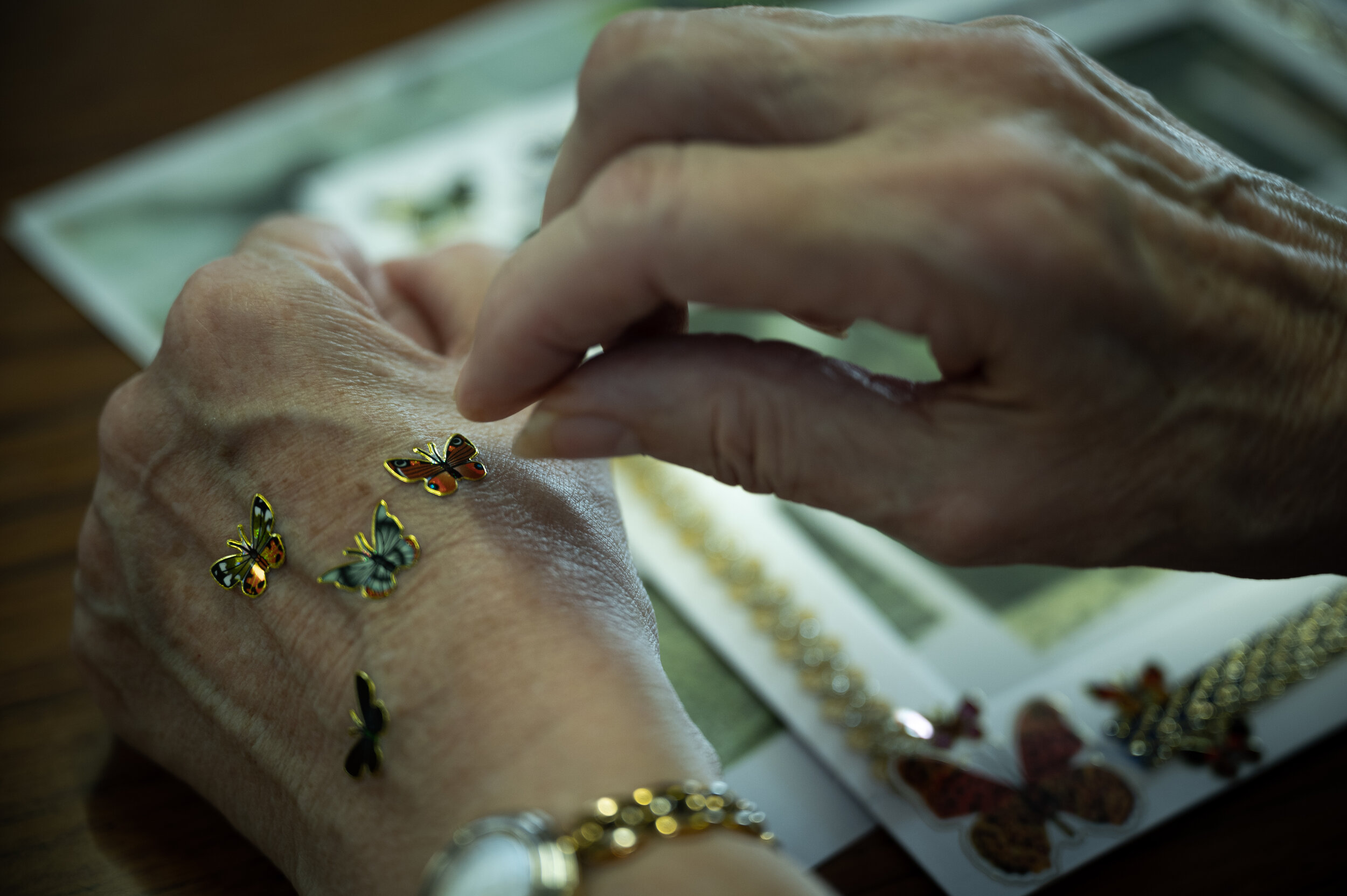
Another dementia-friendly cafe. These charities provide much needed activities for those who are struggling. It also allows carers to talk. Most crafts end up on her hands and skin.
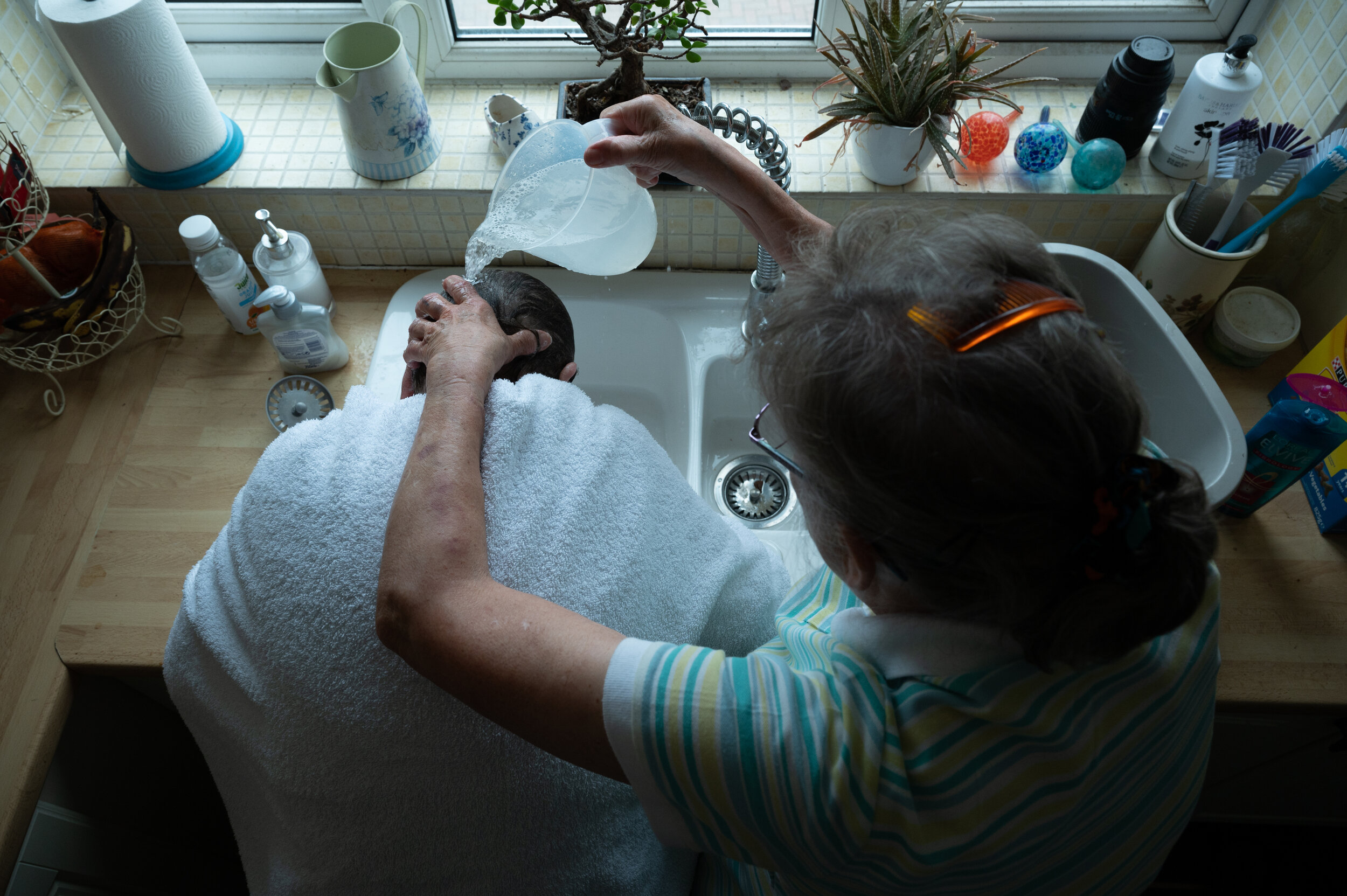
A friend washes mum's hair. After being diagnosed with dementia, friends were few and far between. Mum became isolated as friends and family began to distance themselves. A common occurence people with dementia.
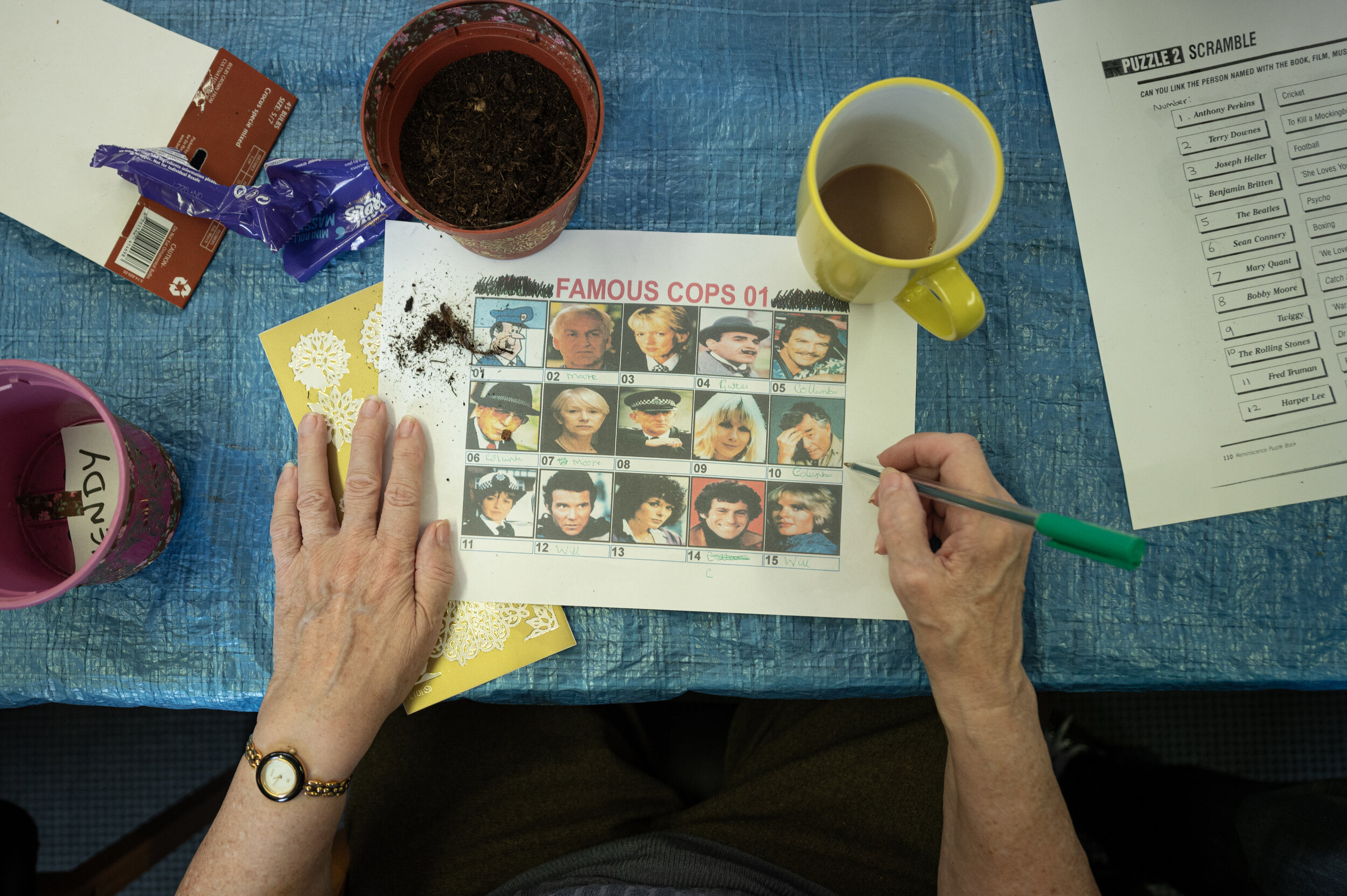
The Salvation Army has always been something mum has devoted a lot of her time to. Here she is welcomed to a dementia friendly event that has quizzes and craft sessions. Regular stimulus helps prolong cognitive ability and mum gets to see some of her old friends who volunteer at the group. Although it’s plain to see she can’t quite remember names to faces, we have fun together.
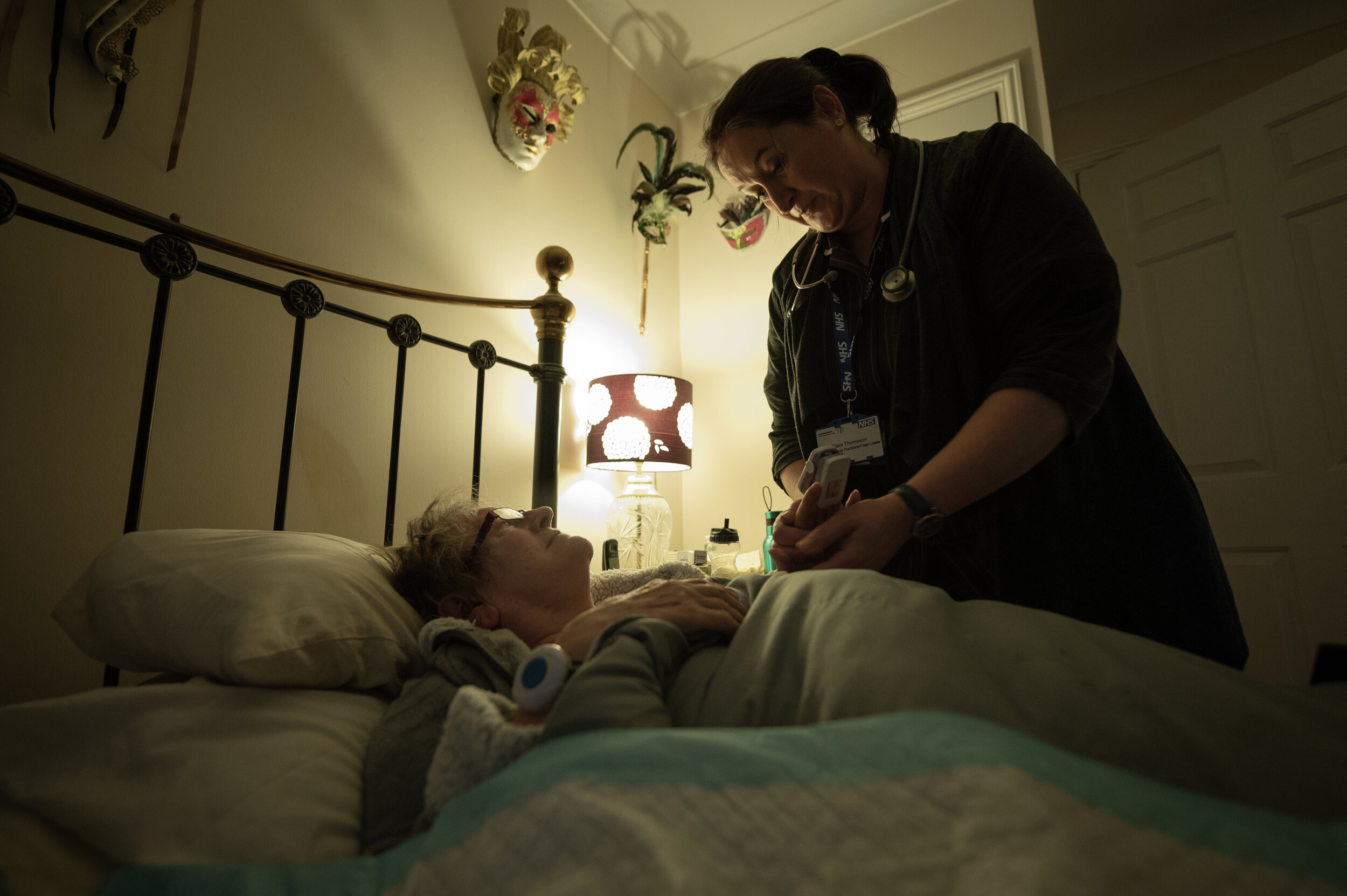
As pneumonia creeps its way into her lungs, home visits from the doctor become the only way to be treated. Respiratory illness is by far one of the most dangerous conditions for those suffering with dementia.
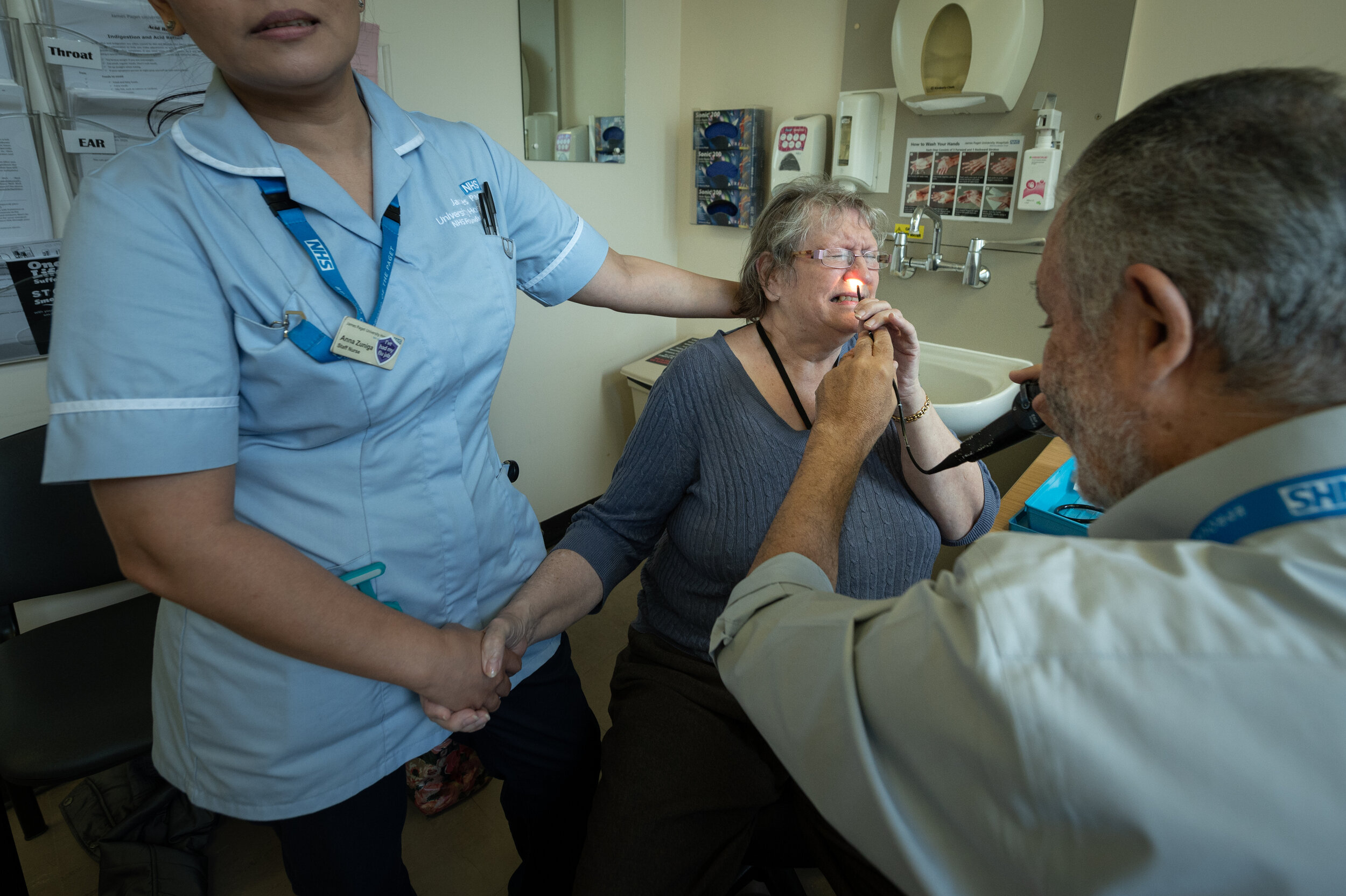
Frontotemporal dementia is a cruel disease, affecting all the forward parts of the brain that help control the body whilst leaving the memory and person that exists at the back of the brain relatively intact, but trapped. The first sign of decline is often dysfagia, the inability to swallow properly. Swallowing is such a complex mechanical affair and the brain can no longer send the right signals to the body. Here mum has an endoscopic examination to asses her difficulties. Food and diet will now have to be drastically altered.
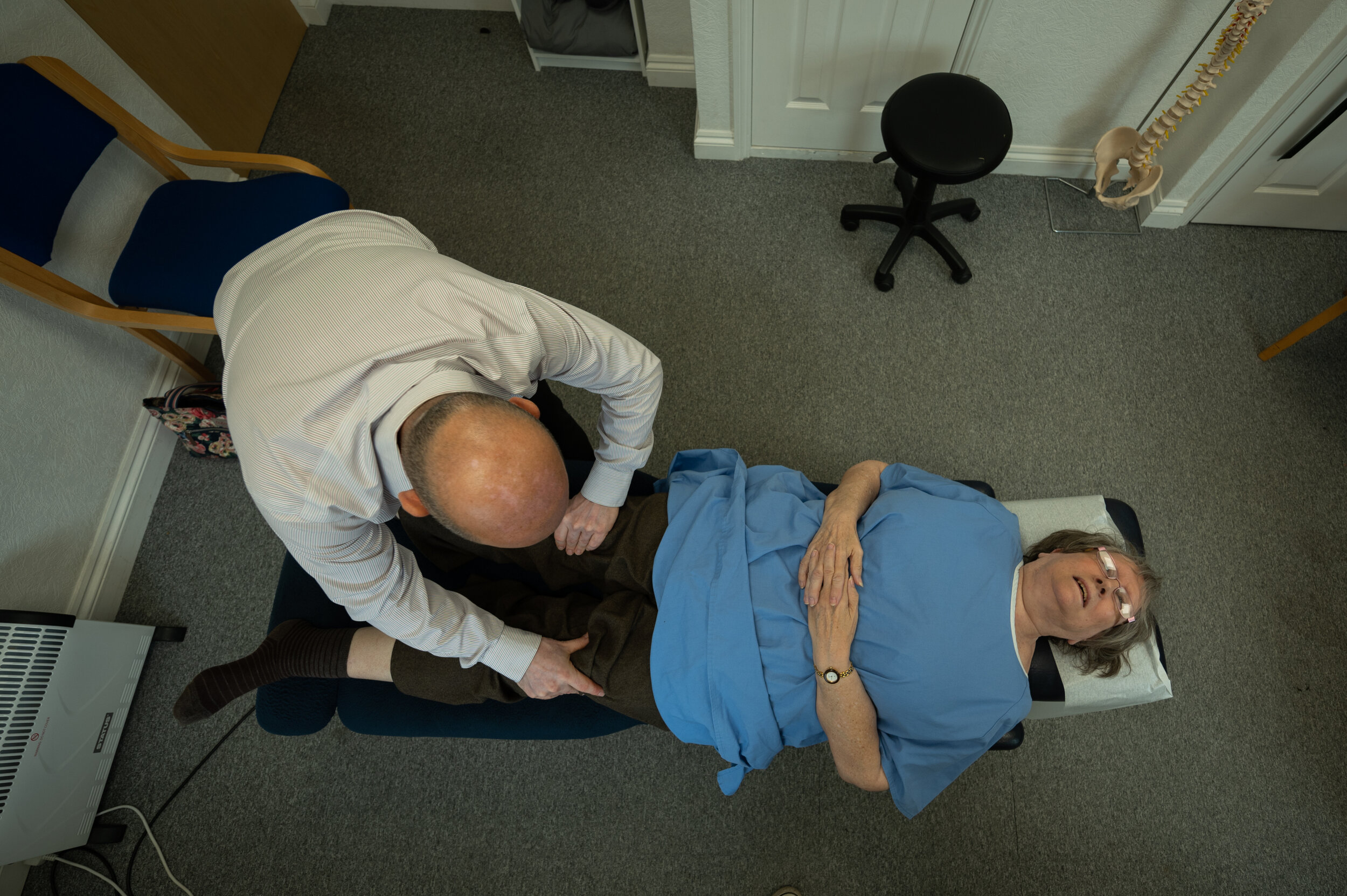
Inspections after small falls become part of life. Also I am taught new techniques in how to keep her mobile and safe with new training exercises. Studies now find links between dementia and motor neurones disease so notes are taken to compile for further data.
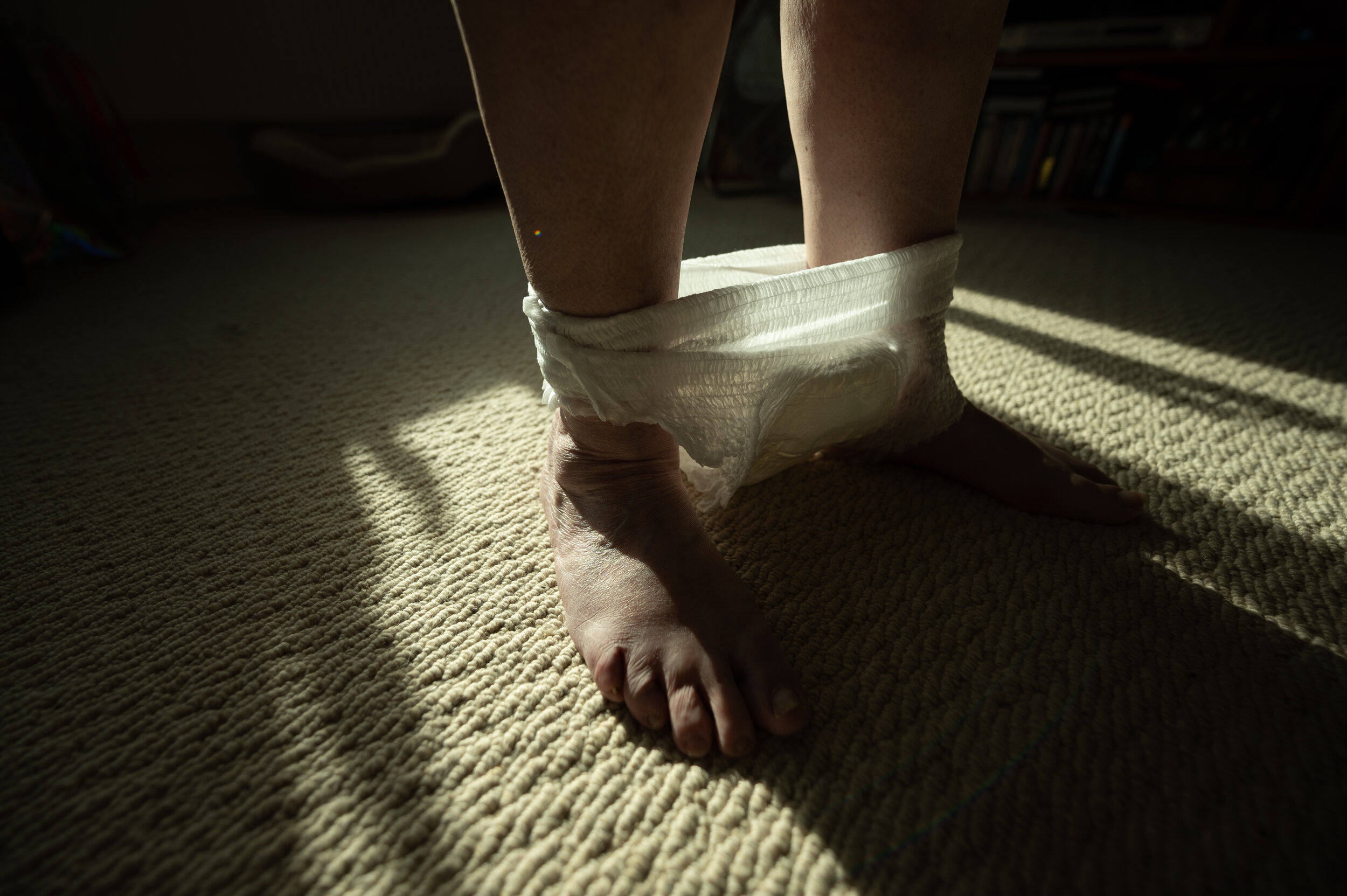
A daily struggle for mum is incontinence. As time moves on, full bathroom and toileting care is essential and changes day and night are regular. Janice has become like a toddler, unlearning a skill each day. I do my best to make sure she doesn't feel in any way undignified. Every change is done with a smile, with matter of fact chit chit about what I might cook for lunch, etc.
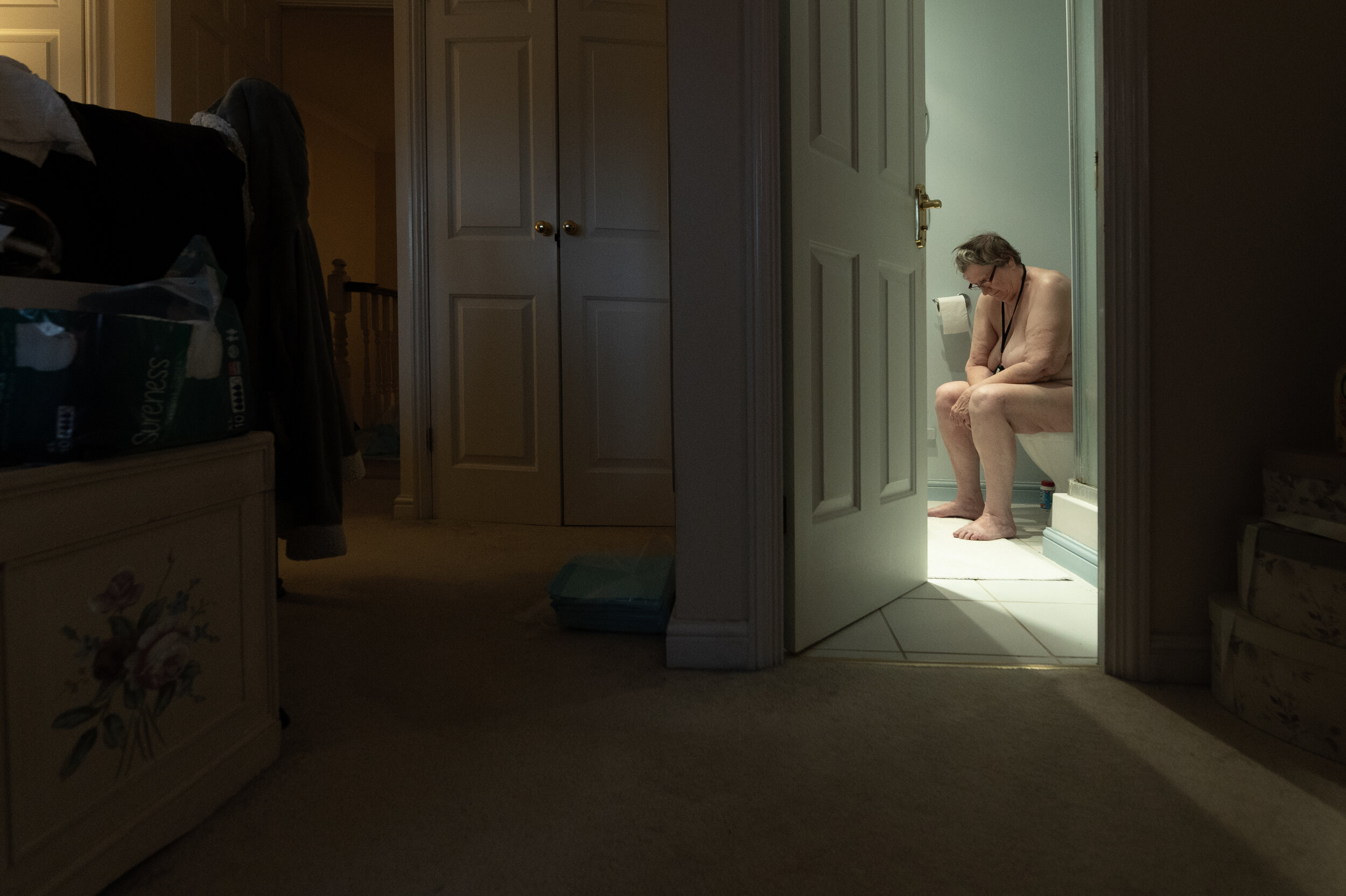
As mum's motor control starts to fail her she must be lifted and carried to the bathroom. I must sit and wait to make sure she does not attempt to get up alone as there is great risk of fall. As Janice's brain mass decreases, messages to the body become confused and events such as this can take up to an hour.
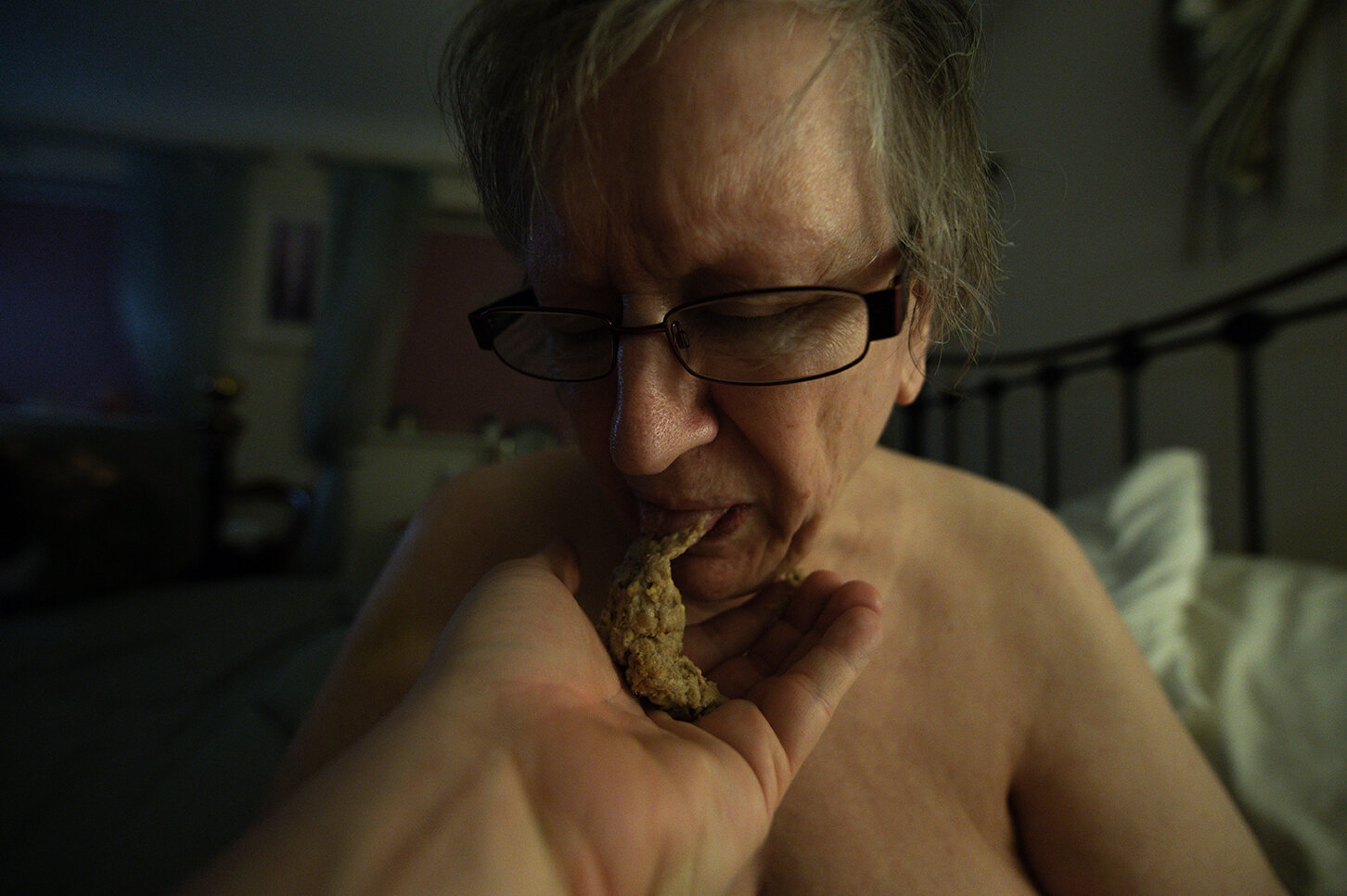
The simple action of swallowing is easily taken for granted. Her brain can't send the correct messages to the many muscles that make up the complicated dance of swallowing, and so it becomes necessary to romove food from her throat to avoid aspirating or choking.
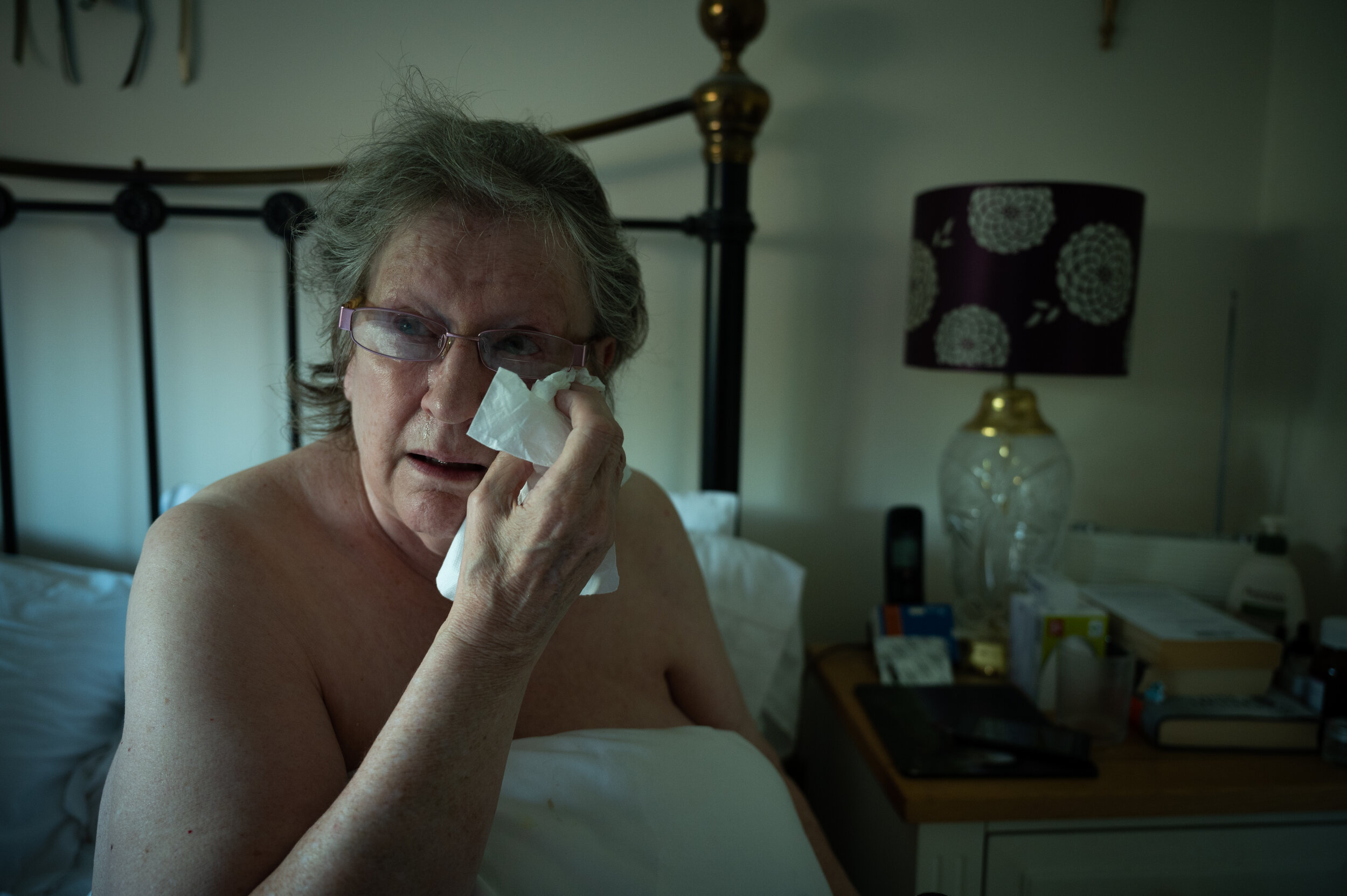
As her speech fails, communication becomes difficult and frustrating. Writing messages by hand is also now impossible. Mum's frustration and fear can often get the better of her but I try to make her feel relaxed.
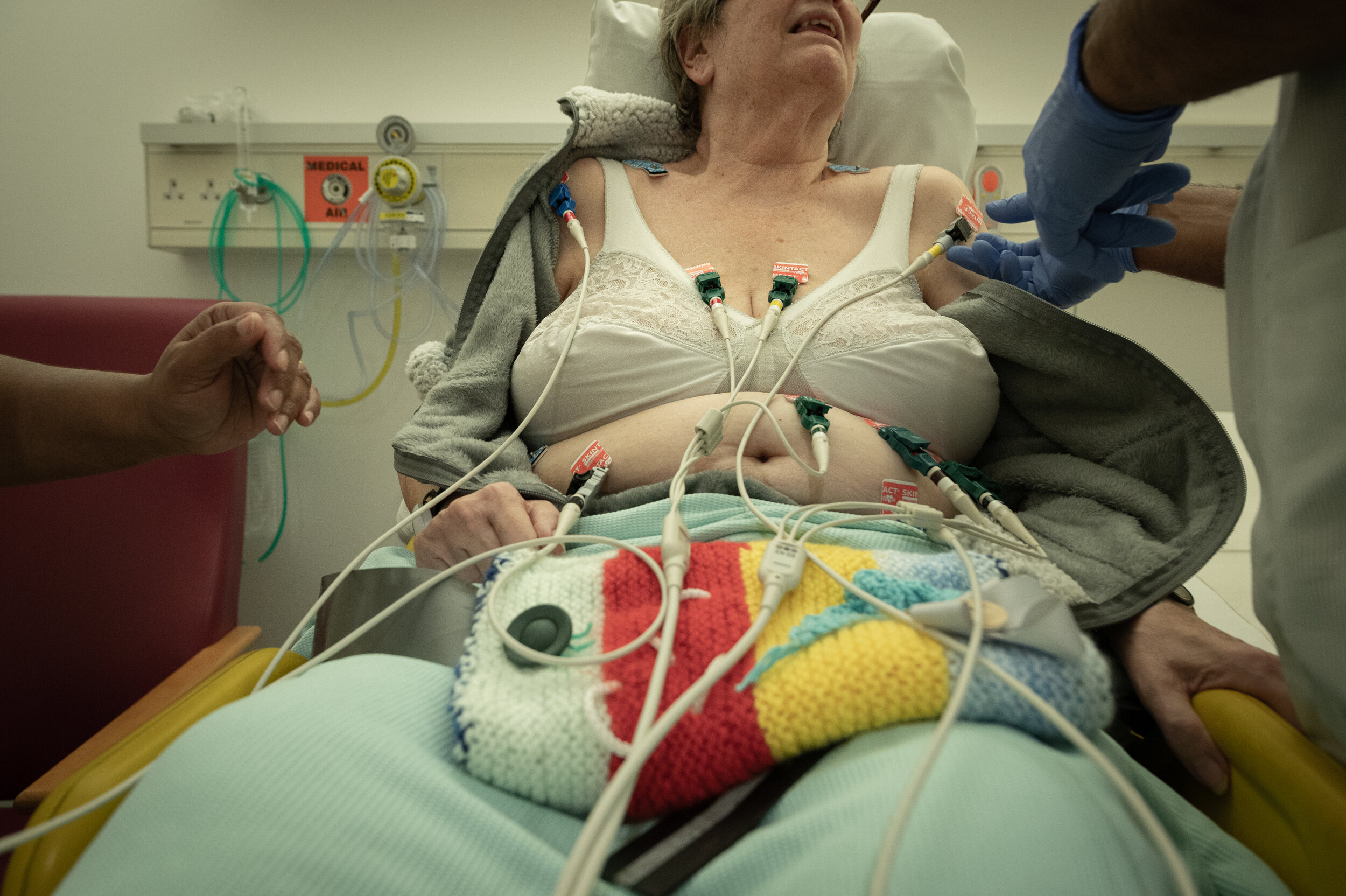
Food and liquid has entered mum's lungs, a condition called aspirating, due to complications with swallowing. As wires creep up her body, panic takes over. The space between reality and perception blurs during stressful times. I realize that for a few months Janice would get me to check under her bed for snakes, her biggest fear, that they might crawl up her at night. Mum is given a yellow wristband signaling to staff she has dementia. Their hands move slow around her and they talk to her calmly and wear broad smiles. These wristbands let NHS staff easily recognize a patient’s needs.
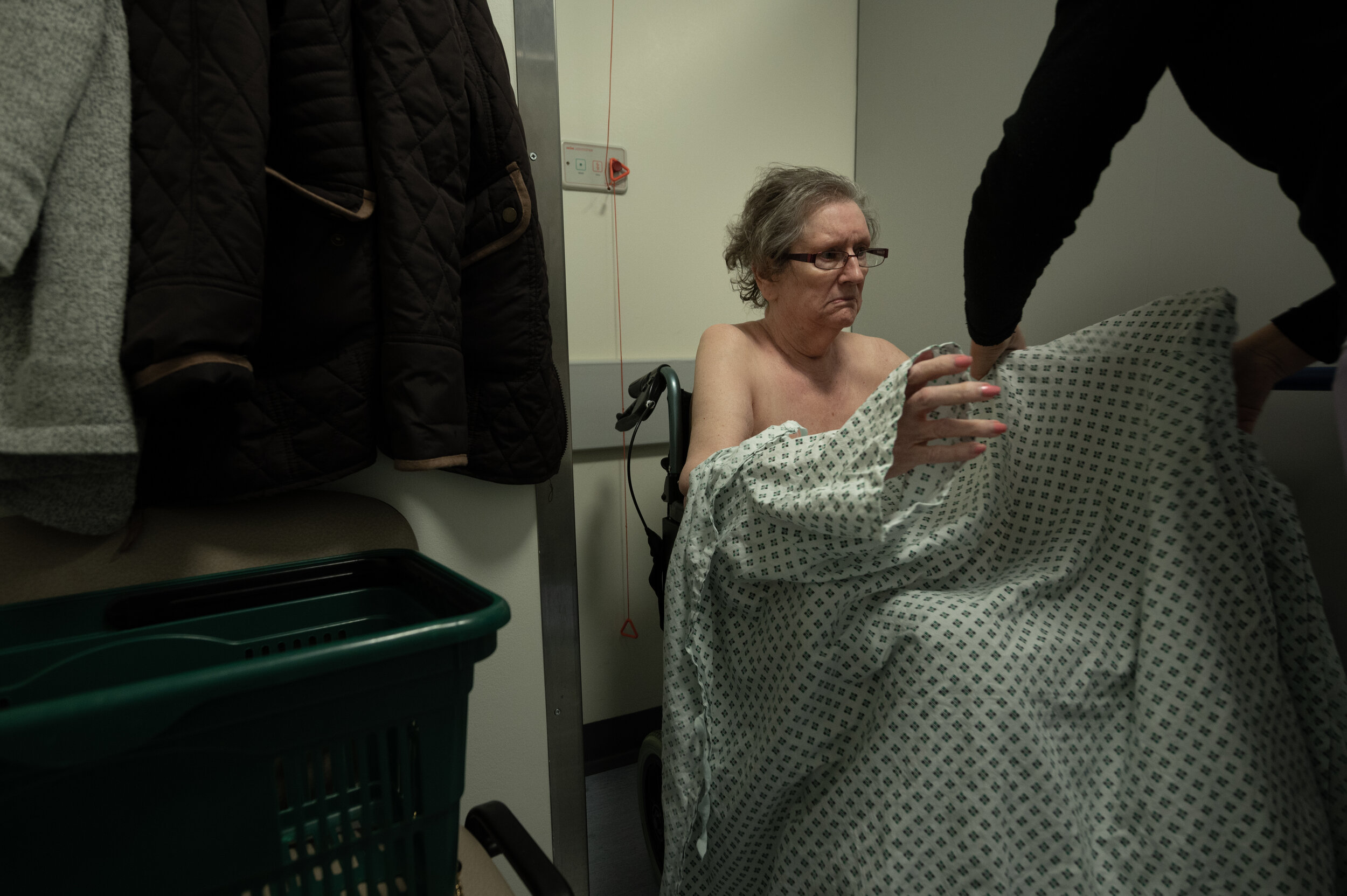
Again mum finds herself back in hospital. She has given up drinking and eating. Weight loss is quick and dramatic. We had a very important conversation regarding tube feeding some years back. She made me promise not to put her through it. It's always essential for patients and caregivers to have frank talks regarding these issues ahead of cognitive decline.
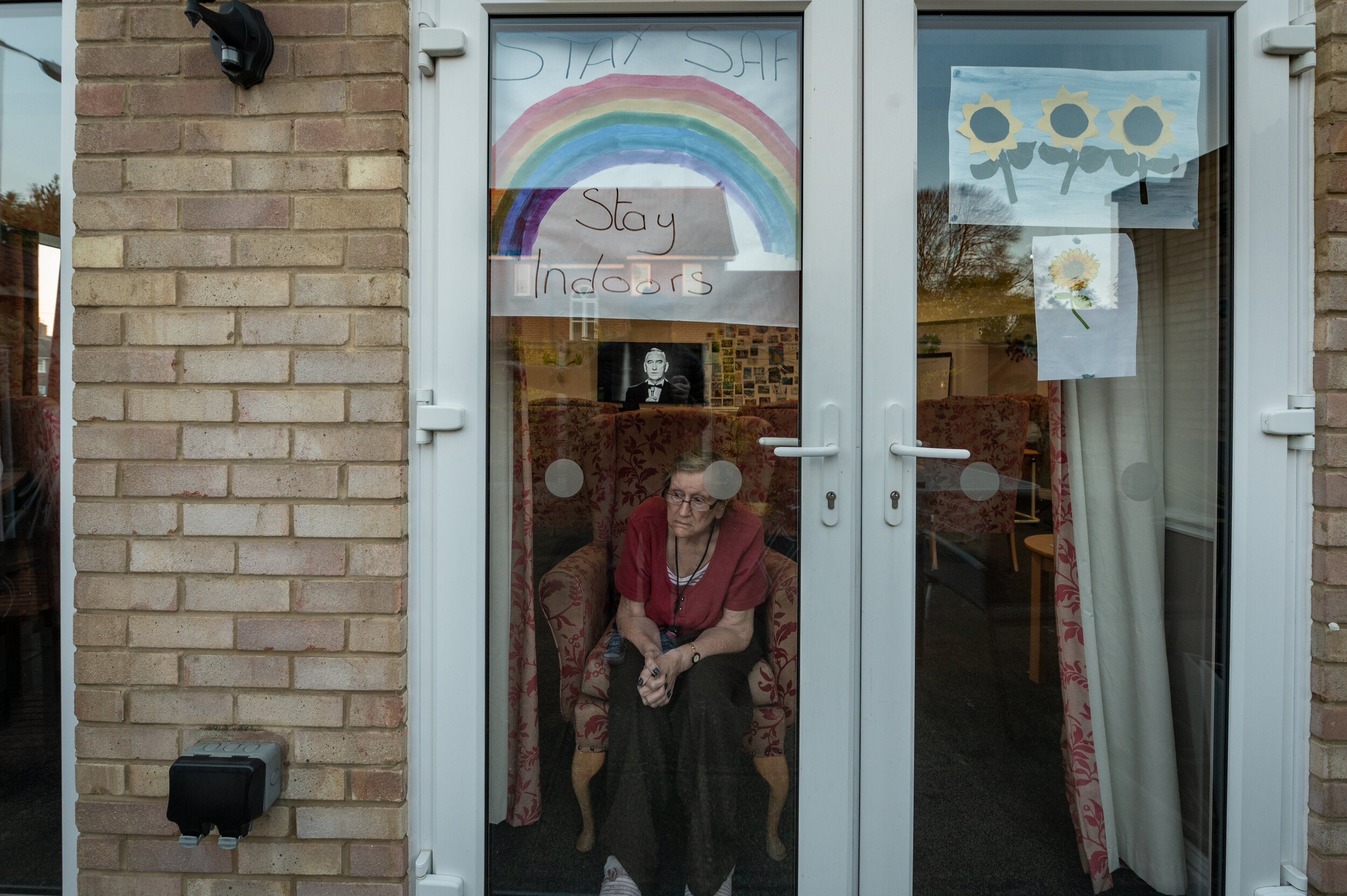
How do you convey to someone who suffers from dementia the complexities of an international lockdown due to a pandemic. All she wonders is why I don’t come in, or so I imagine. It feels cruel to keep looking at her like a zoo animal each day. She lost the ability to read sometime back, so I can’t write a letter to explain. Simple questions register, but a long explanation regarding the Corona virus simply does not register. I can only hope that staff do their best to measure her and make sure I am there each day. The National Health Service in the United Kingdom is one of the countries best assets and we would be lost without it. The public have made gestures of painting rainbows for the windows of our homes and businesses and can be seen throughout villages, towns and cities.
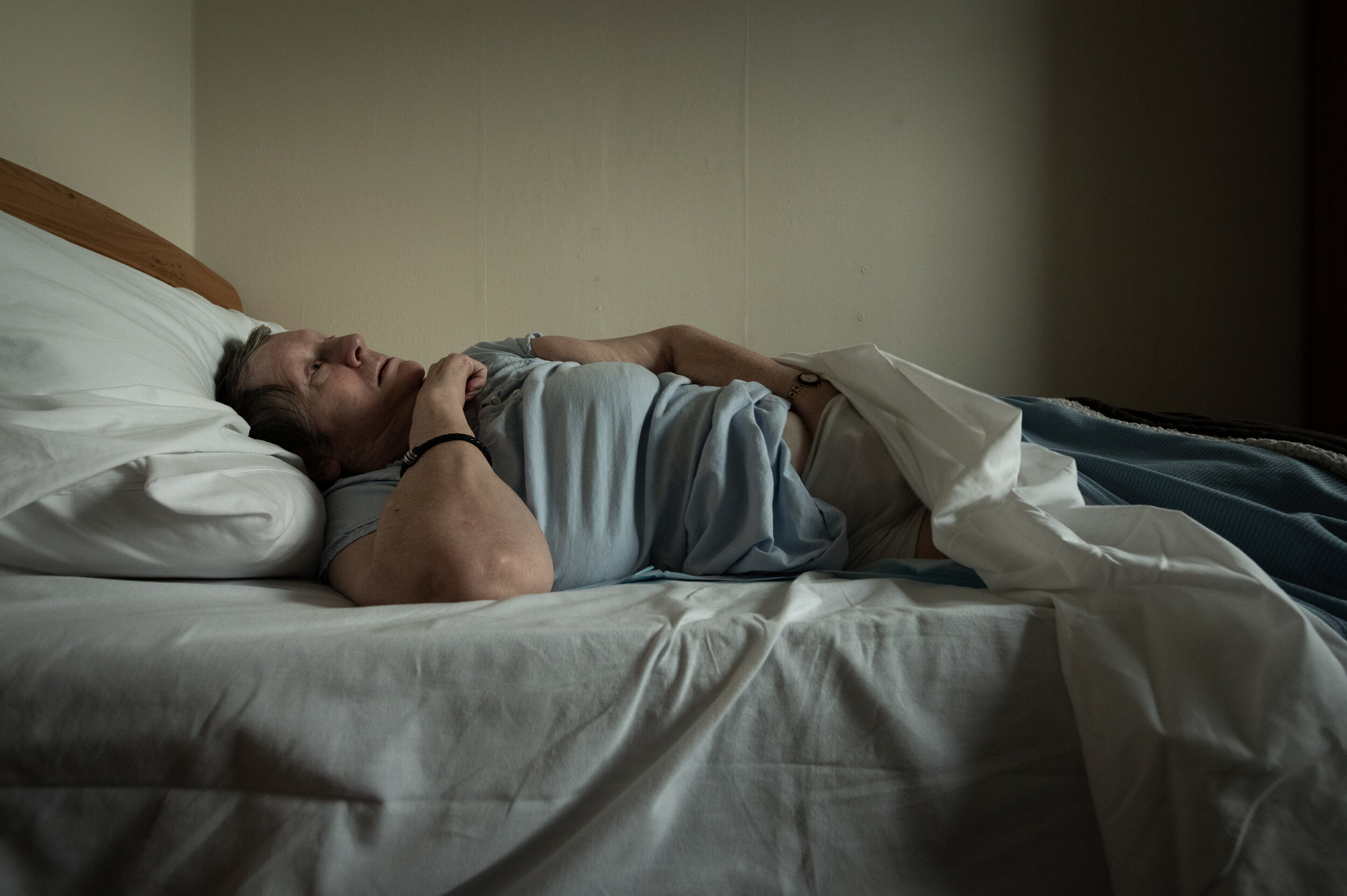
Dementia sweeps away dignity with no prejudice. People may wander naked or masturbate involuntarily. Her body doesn’t seem to be her home anymore and I find it increasingly hard to find 'her' each morning.
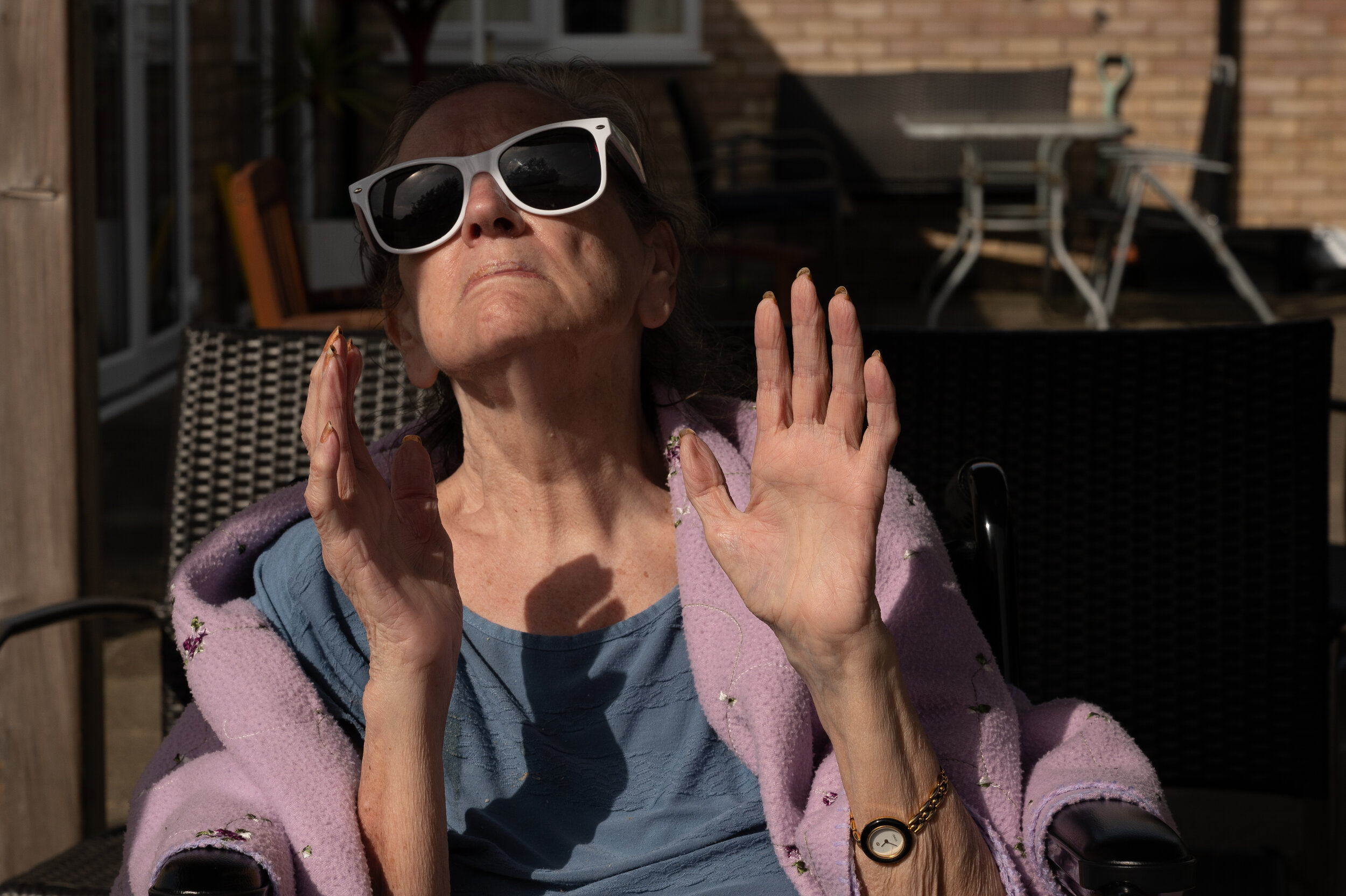
A brief respite between lockdowns brings a chance for Janice to sit outside and enjoy a moment in the sunshine. This was the first time in seven months that her or any of the other residents would have smelled the fresh air or seen the sky with their own eyes. Not all at the care home were as lucky.
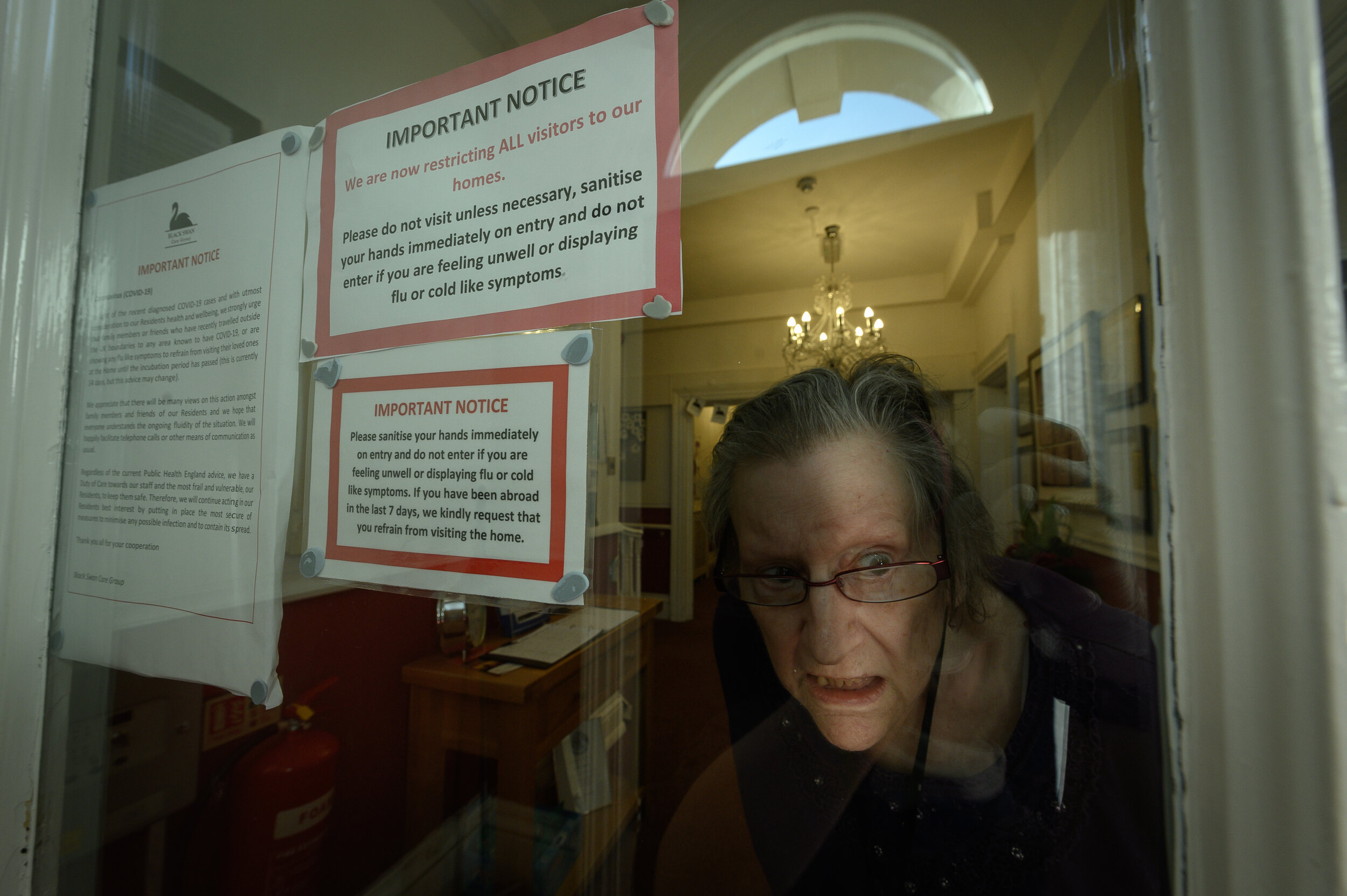
In Britain we watched in shock as deaths in Italy and Spain rose to 900 a day, but now here in Britain the death toll has risen to similar daily figures.
Care industry leaders and the Alzheimer’s Society say they believe the Novel Coronavirus is now active in around half of UK care settings, which look after around 400,000 people in total. This is far higher than the estimate given by Prof Chris Whitty, the UK government’s chief medical officer, who said on Tuesday that just over 9% of care homes had cases of Covid-19.
Reports from Europe speak of homes that have been abandoned and left for fire departments to attend to once the virus has done its work. With cases rising here at home and care workers at ever increasing risk, anxiety grows within the community of residents and families who can only watch.
The Alzheimer’s Society said on Thursday it fears hundreds of thousands of people with dementia “are being abandoned in care homes”. The trade union Unison also sent a dossier of hundreds of carers’ complaints about a lack of PPE to ministers, including one report of a carer wearing a bag over their face in the absence of a mask.
This photograph is of my mother who glances at the sunshine through a gap in the reception door of her care home. The image is taken from my ongoing project ‘Keeping Mum’ which is now in its third year. It is intended to be the first photostory that documents Frontotemporal Dementia from diagnosis to death.
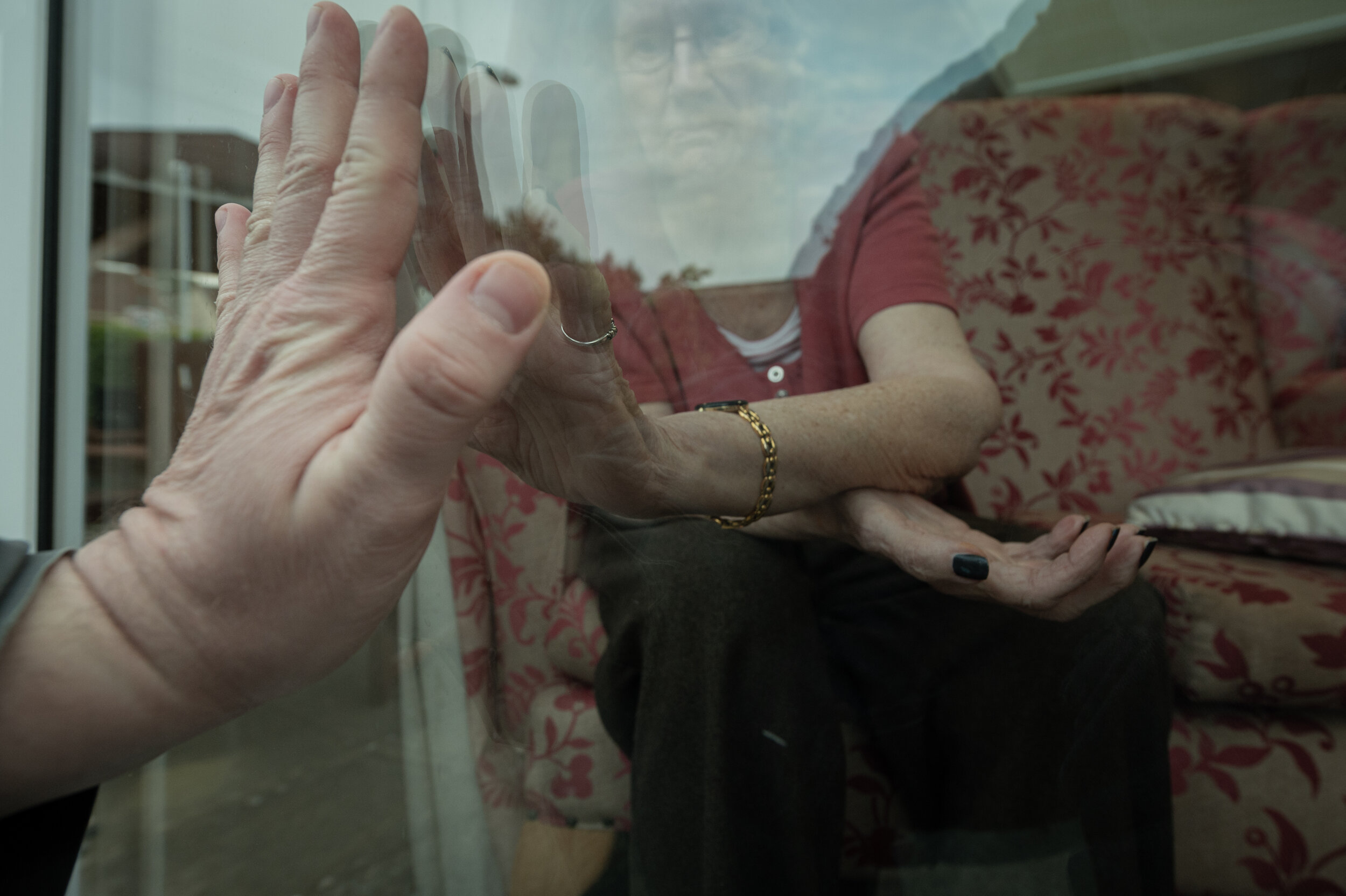
What of human contact? With the announcement of further lockdown in the U.K. for another three weeks, the reality is that it will likely extend to September. Care homes and schools are only in their first month of a four month mandatory lockdown.
Few scientists expect a covid-19 vaccine to be available until the spring of 2021 at the earliest, and Its been suggested by former British director at the World Health Organization, Professor Anthony Costello, that the UK could face as many as six waves of the coronavirus before then.
Social distancing is currently our best form of defense from the virus and life may look very different in the future as some of the measures of distancing and the wearing of masks, etc, become part of everyday life.
What does this say for the simple need for human contact? Physical contact is part of our natural expression and culture, but the facts as they stand are that they may have to be replaced for a very long time with technological substitutes. Zoom, FaceTime, Hangouts and Skype fill the gap for social communication but the human animal, like most all animals, needs more.
For many the prospect of not being able to hold a loved one, their child or relative may seem exceptionally difficult and the question of how our society adjusts to this, now and in the future, is an interesting one.
This image is the latest in my ongoing project ‘Keeping Mum’ which is now in its third year. It is intended to be the first photostory that documents Frontotemporal Dementia from diagnosis to death.
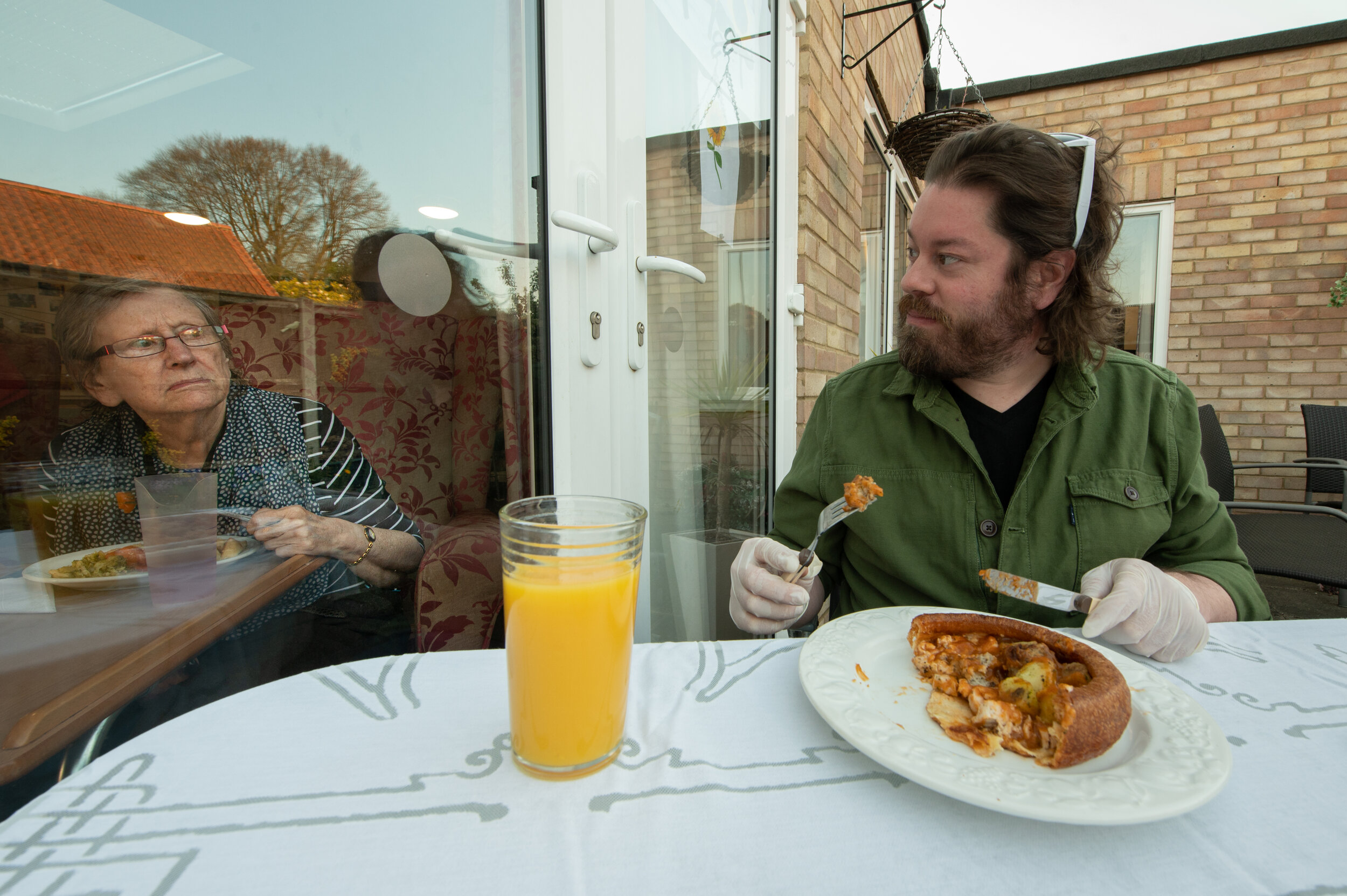
Continuity is one of the most important things to maintain with dementia patients. Made harder still by lockdown, I try to improvise new methods so mum knows when to eat and indeed what food is. As I cant feed her myself I try setting a table outside her window and attempt to trigger the memory part of her brain to make a 'lunch time' auto-response. This technique has now been put in to practice by the NHS. Dementia has exceptional challenges to overcome but made all the harder for the outbreak of the covid-19 virus.

After a long stay in hospital it is deemed necessary that mum should have a period of respite in a care home before coming back to her house. Then the covid-19 came along. No one is allowed in or out of the care facility. Although I can see her at the window, I can't make her see me. Without smell or touch I am unrecognizable to her. I always attend the window at feeding time as her form of dementia leaves her with a need for continuity. If I’m not present at meal times she will not eat. Since lockdown she has lost a high percentage of body mass.
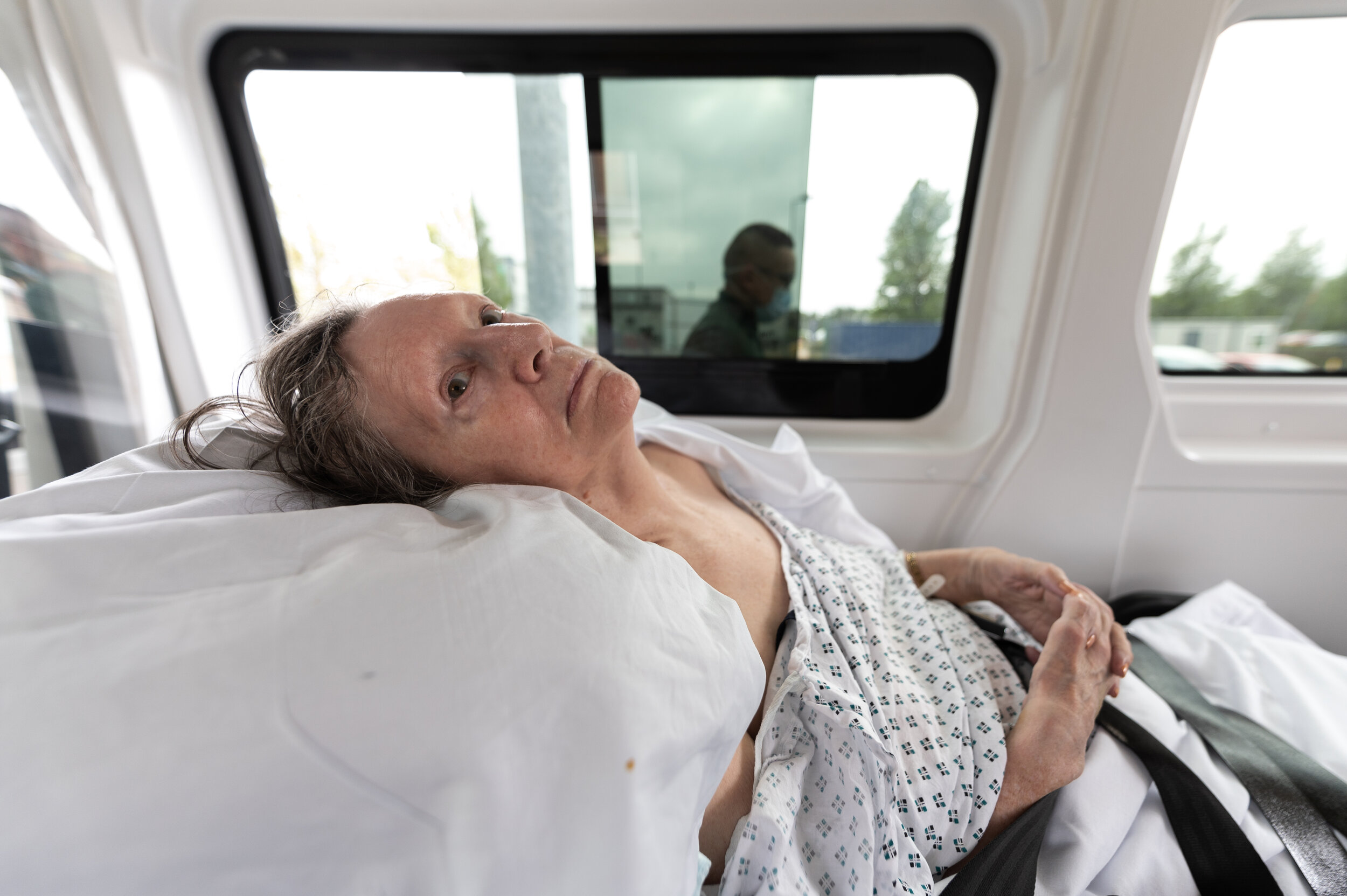
Pneumonia will mostly attack people who have dementia because of a compromised immune system. Research suggests that caregivers should determine the goal of care before they go ahead and administer the antibiotics. Studies reveal that while antibiotics may give an individual more time to live, they can also be the case of a decrease in comfort rates. Antibiotics may cause adverse side effects like severe digestive upset and multiple allergic reactions. Mum is discharged after her latest trip to hospital, I taker the decision to halt anitibiotics for her own comfort and wellbeing.
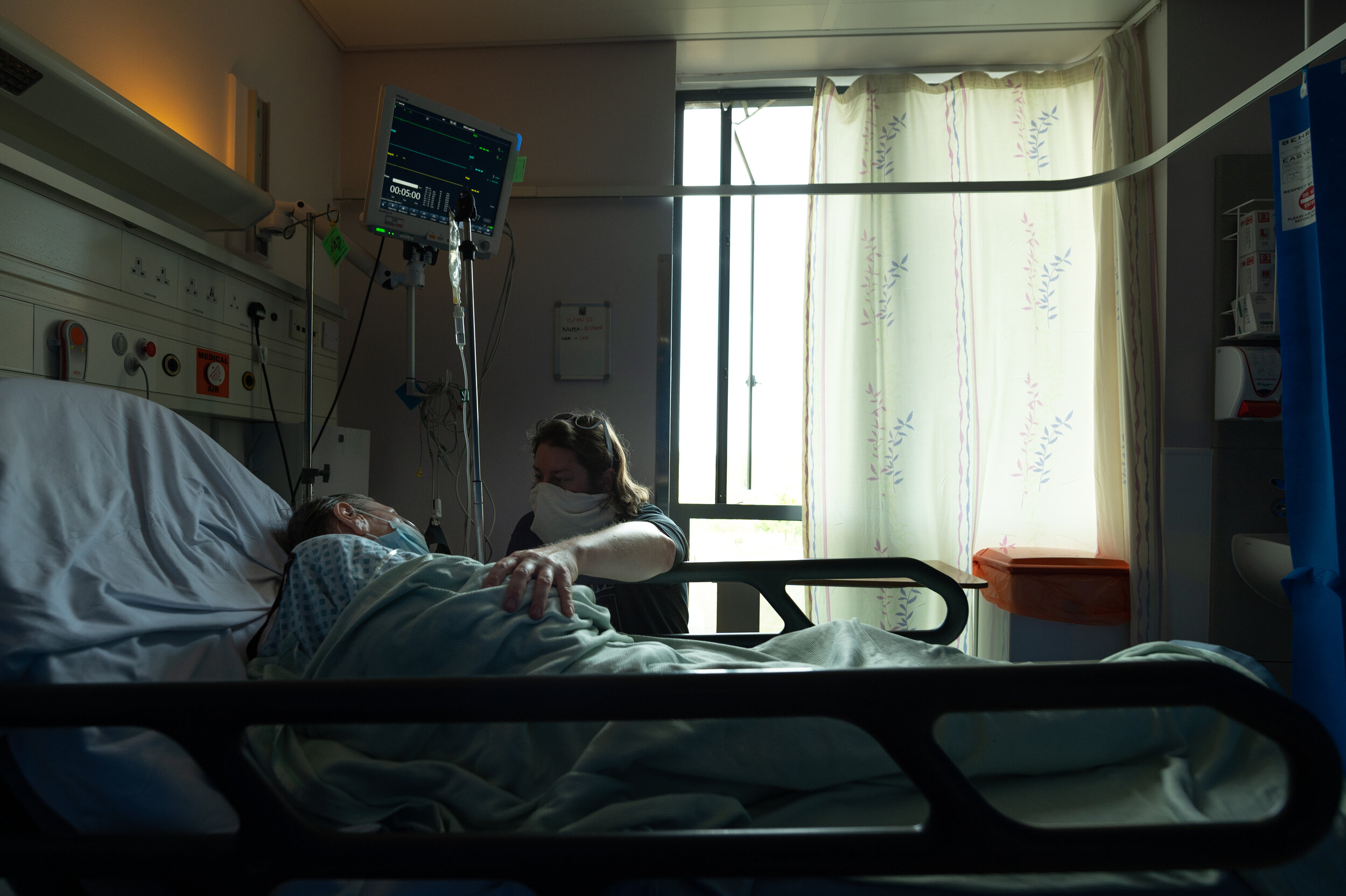
As we wait for Janice's corona virus results to return we are placed in to a specialist covid ward. All around the sounds of those fighting for air fill the ward with frighting sounds. Some lose their fight and I try to keep mum from feeling scared.
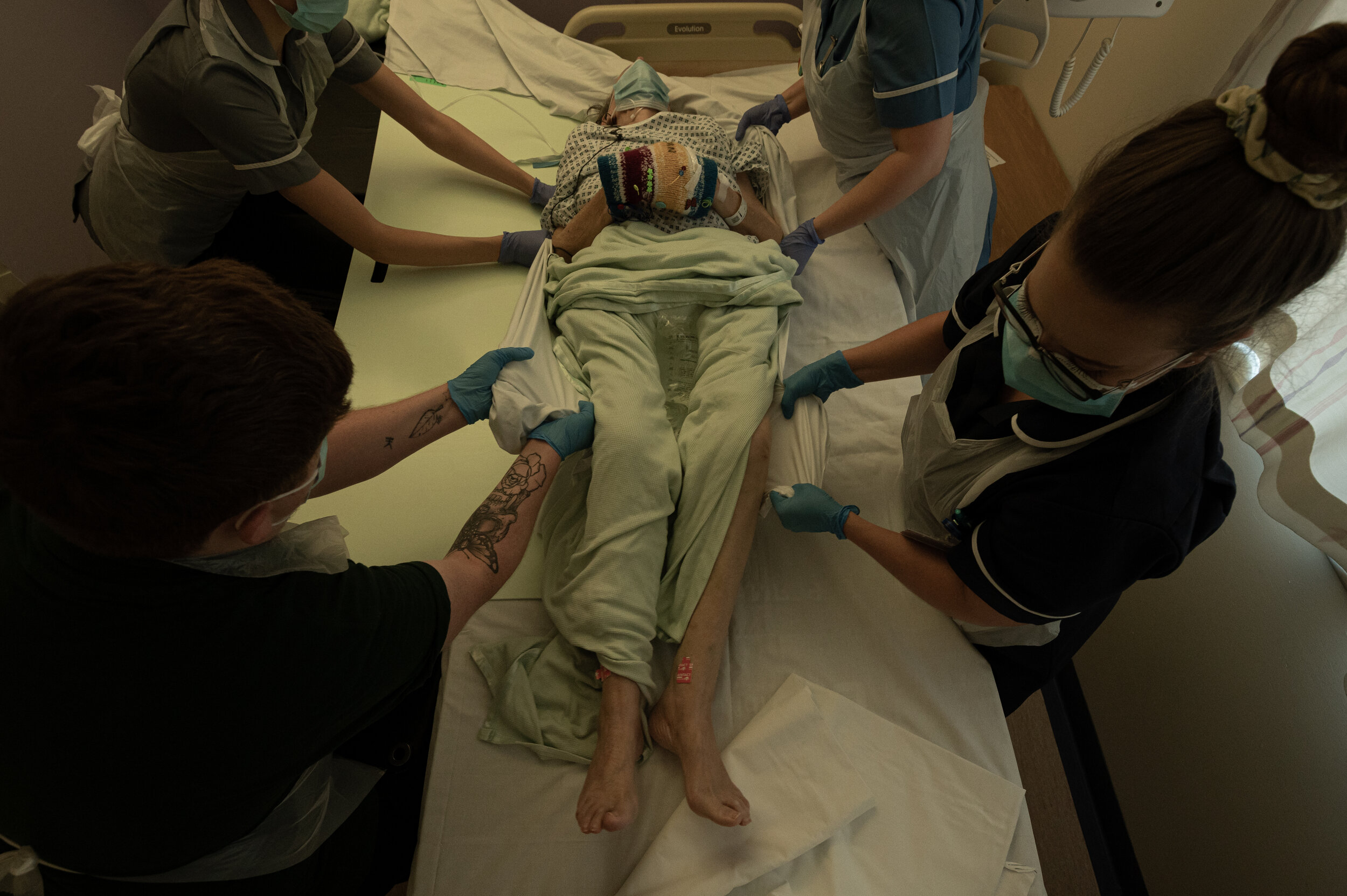
Cardiovascular risk factors (CRF) are widely described as related to dementia. There are very few studies regarding this association in Frontotemporal dementia. During the profound stages it is common for organ failure to occur. In this instance Janice has suffered a heart attack. A knowledge of risk factors for FTD may provide clues to the underlying pathophysiology. Covid is not ruled out and tests are administered before being transferred to a dedicated Covid ward.
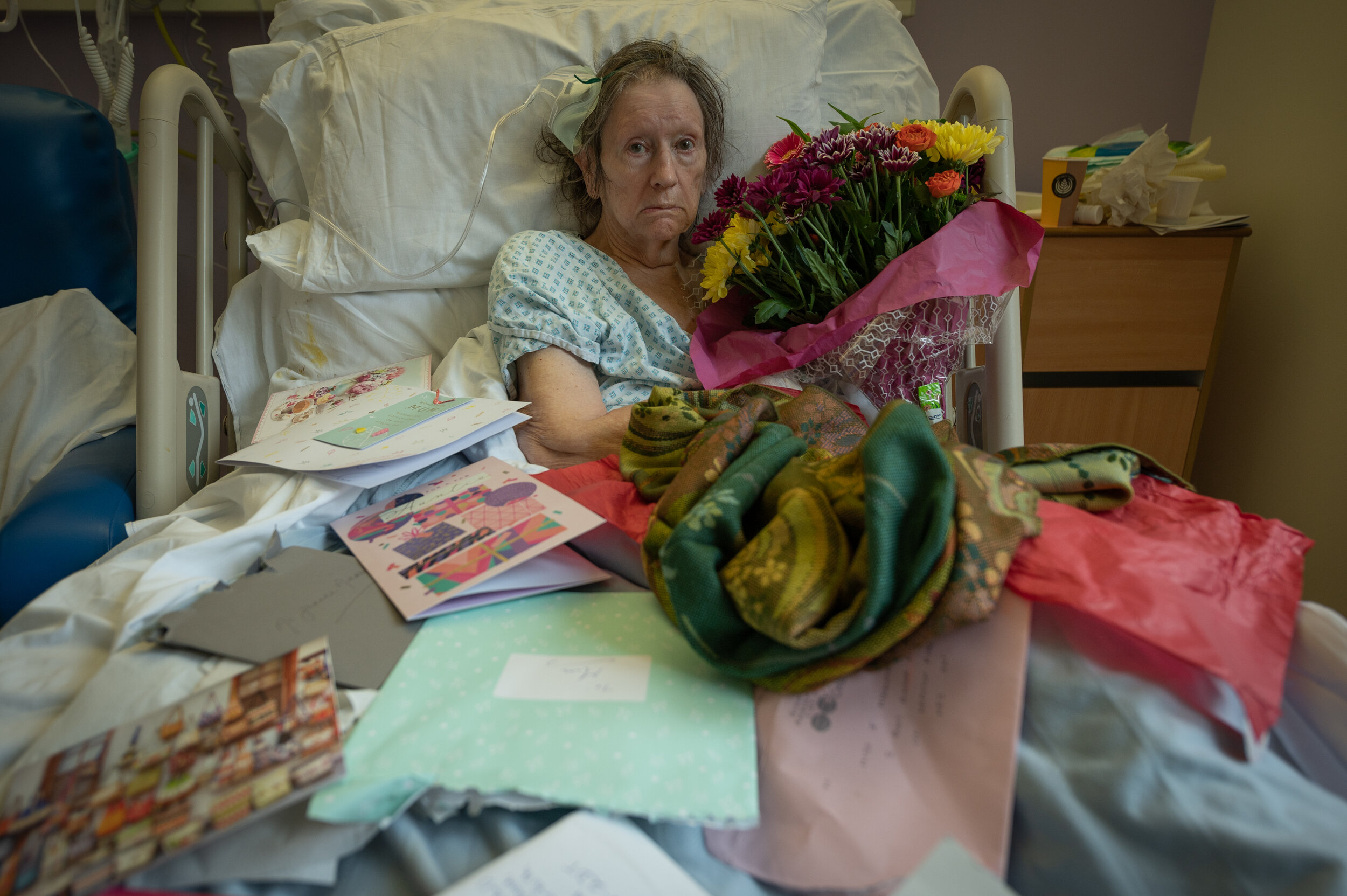
Janice celebrates her last birthday in the Norfolk and Norwich University hospital on the 26 September, 2020. I pack a flight case with treats and have it isolated and treated for any possible traces of Covid. She seems more herself today with memories firing and smiles as I read her cards to her.
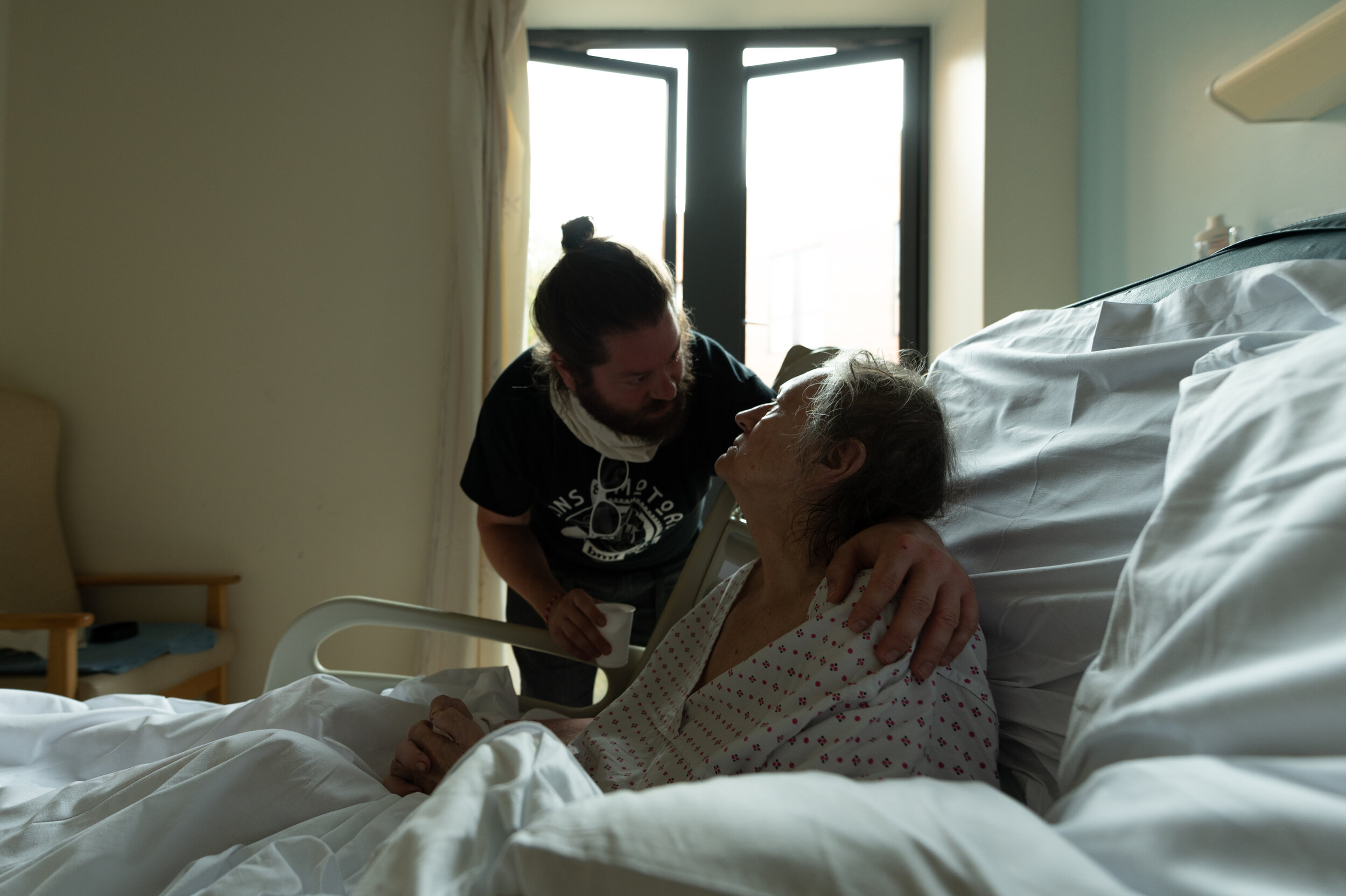
In the early hours of the morning we are back in the emergency room. Suspected congestive heart failure brought about by pneumonia and other issues linked to dementia are starting to become more severe. I do my best to reassure mum as I move myself in to the hospital ward to live and care for mum.
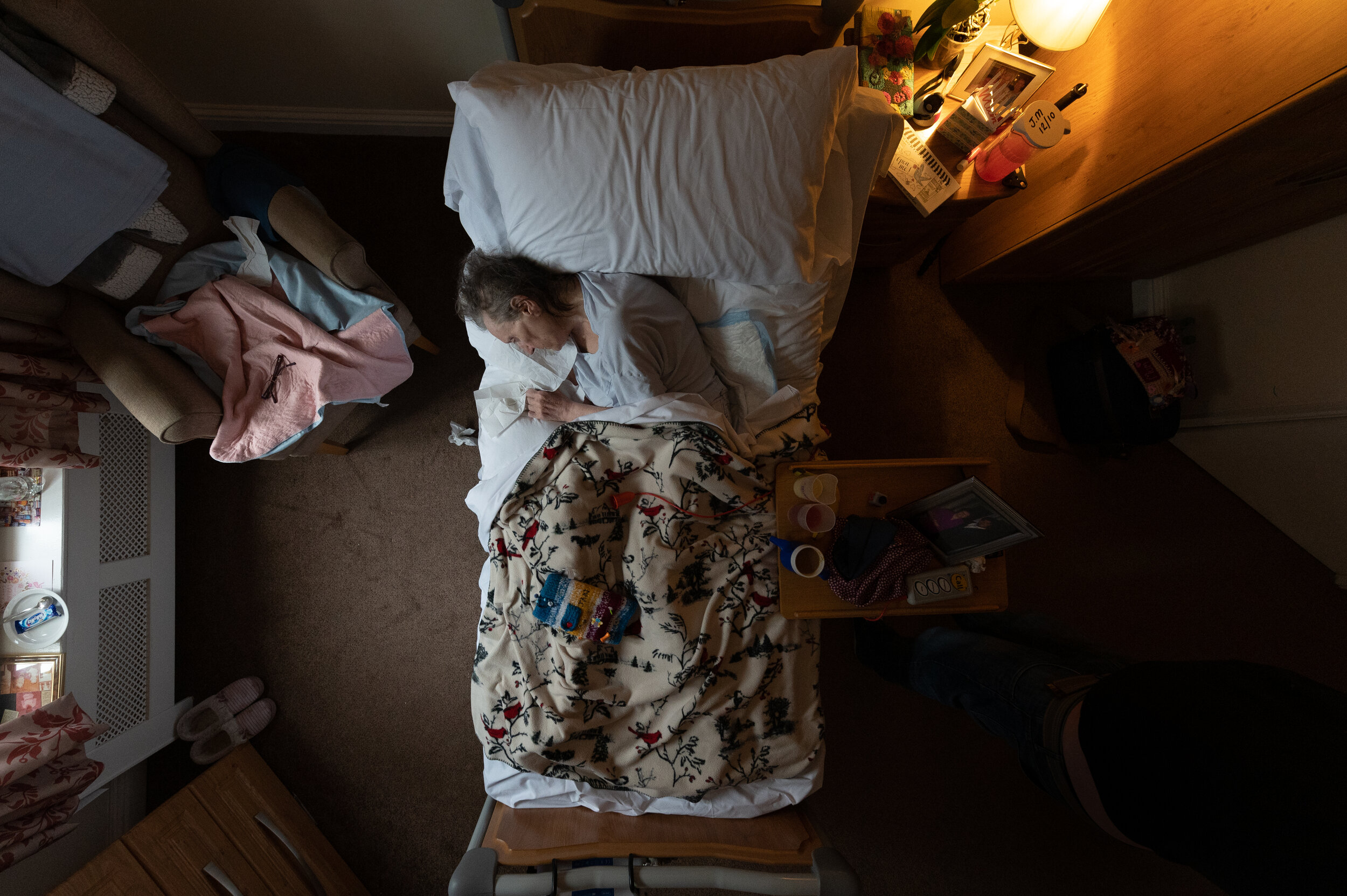
Mum has had such a difficult day. I could tell she was frightened and uncomfortable. She fights hard to breath and i hear the fluid in her lungs. Cold sweats come and go as she holds on to my hand and cries. I wish I could take the suffering away with a click of my fingers.
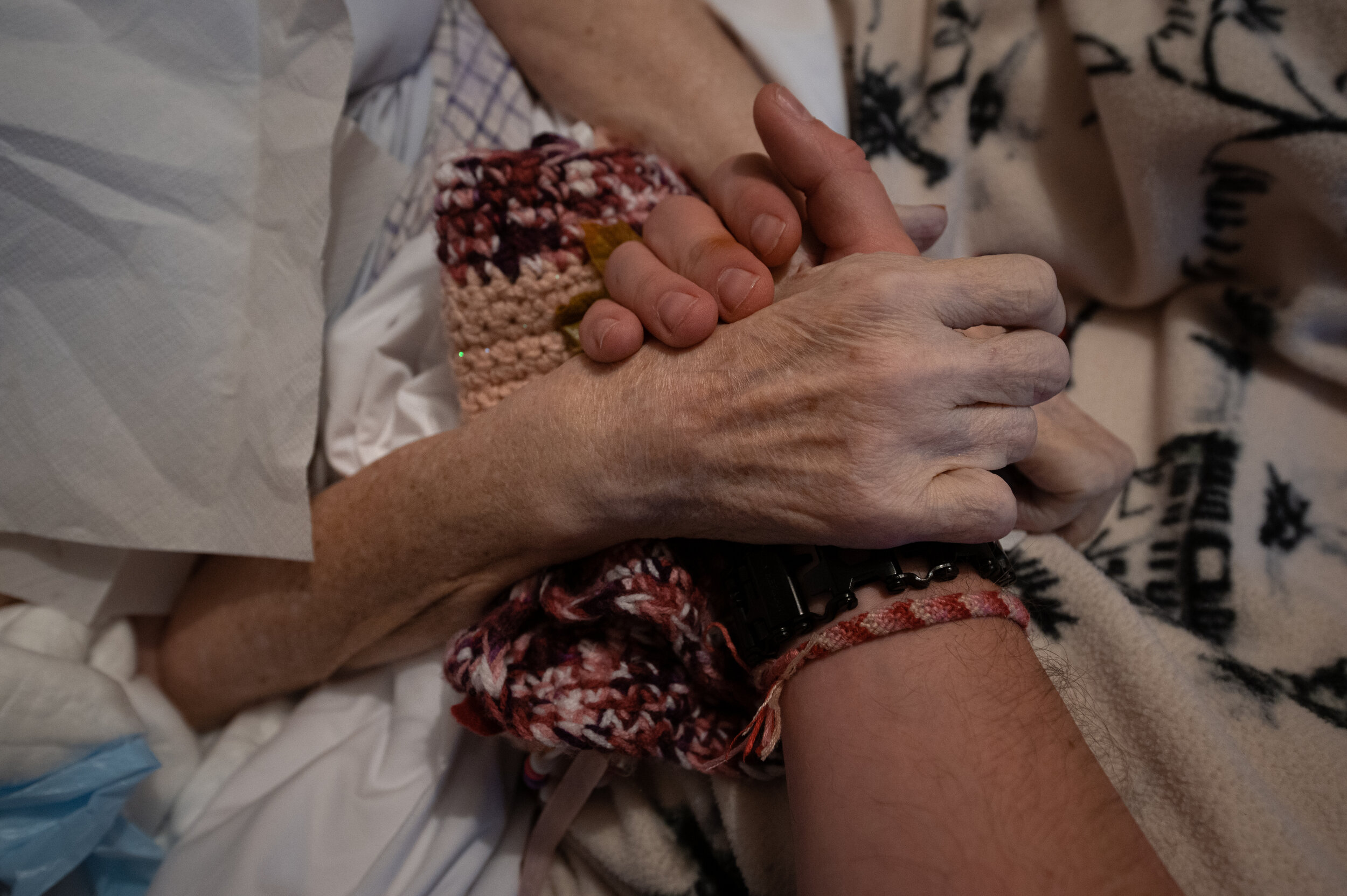
At twenty five minutes past six in the evening, mum slips away. Her breathing became too much of a fight for her. She was held close for a couple of hours and I talked her through the process as best I could. I hope I said the right things, how much she is loved, how it will be ok, that theres no need to be scared and I am right there with her. I continue to hold her over the next hour as her brain slowly shuts down after death. Her hand lightly twitches in mine for sometime after. I am in a pit of bottomless sadness but I am grateful there is no more suffering.
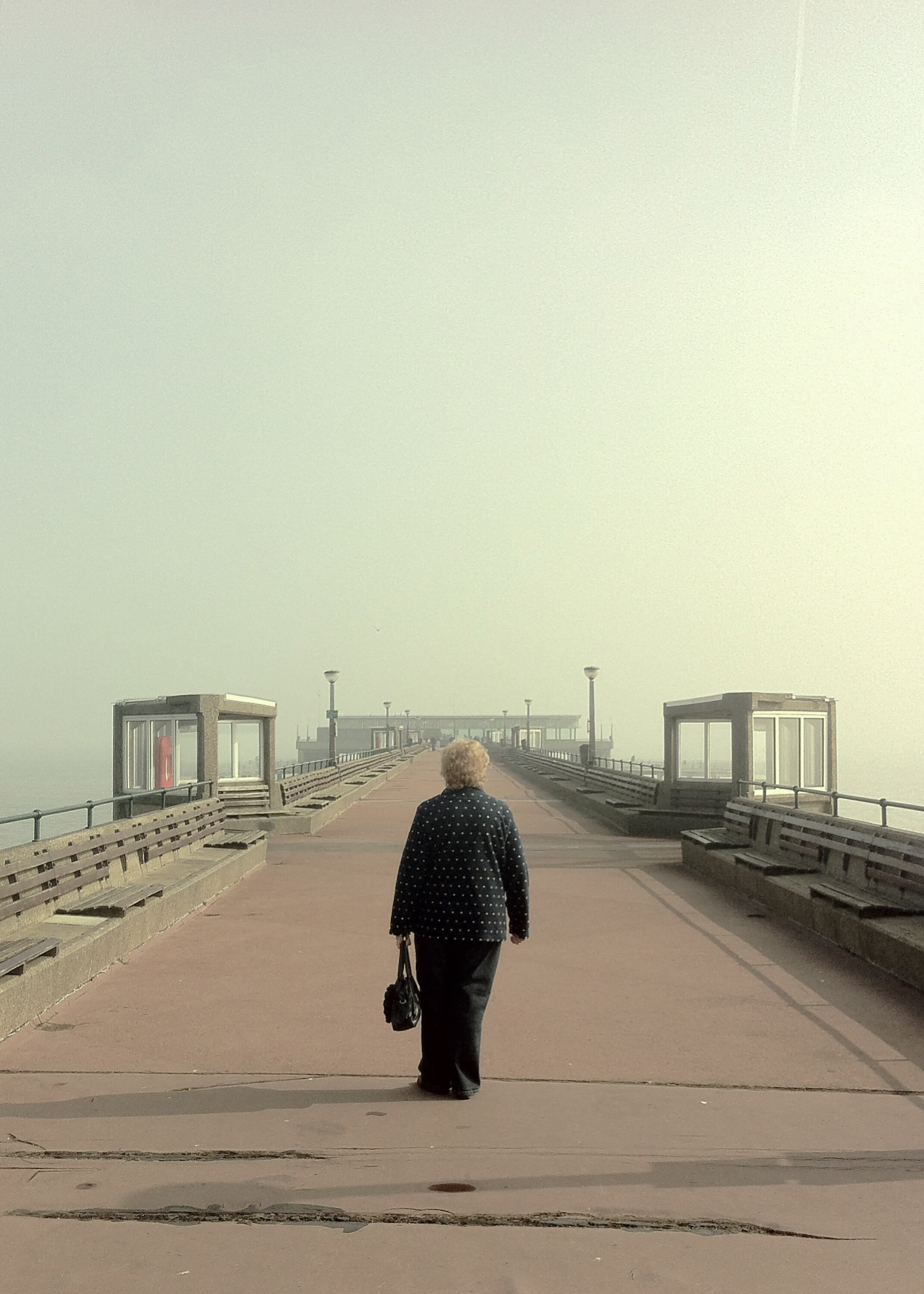
On this day in 2014, Janice walked in to the fog on St Margarets bay piere to spread the ashes of her mother in to the sea. As a child they would both holiday here by the white cliffs of Dover. I like to think she is being waited for here and I will make this same walk to the sea with her ashes.

